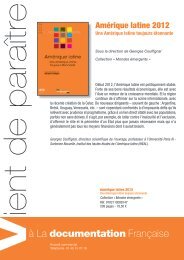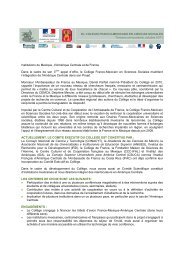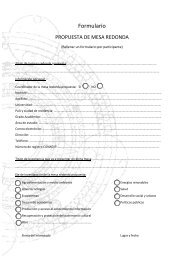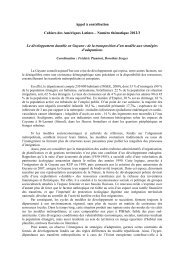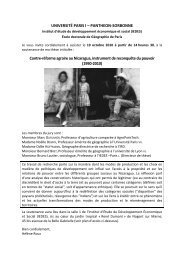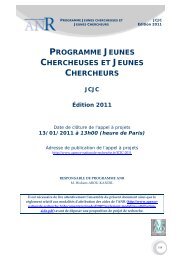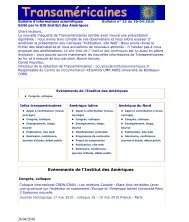Application of the Integrated Theory of Party Change to Latin ...
Application of the Integrated Theory of Party Change to Latin ...
Application of the Integrated Theory of Party Change to Latin ...
You also want an ePaper? Increase the reach of your titles
YUMPU automatically turns print PDFs into web optimized ePapers that Google loves.
<strong>Application</strong> <strong>of</strong> <strong>the</strong> <strong>Integrated</strong> <strong>Theory</strong> <strong>of</strong> <strong>Party</strong> <strong>Change</strong> <strong>to</strong> <strong>Latin</strong><br />
America’s Volatile <strong>Party</strong> Systems<br />
by<br />
Robert Harmel and Michelle M. Taylor-Robinson<br />
Department <strong>of</strong> Political Science<br />
Texas A&M University<br />
College Station, TX 77843-4348 USA<br />
E339mt@polisci.tamu.edu<br />
Paper prepared for presentation at <strong>the</strong> 5 th CEISAL European Congress <strong>of</strong><br />
<strong>Latin</strong>americanists, Brussels, Belgium, April 11-14, 2007.<br />
Abstract: Desarrollamos una teoría de cambios adentro de partidos, usando como una<br />
base la teoría integrada de cambios adentro de partidos (Harmel y Janda 1994), para<br />
investigar cuando y como partidos en América <strong>Latin</strong>a responden a choques elec<strong>to</strong>rales.<br />
Harmel y Janda desarrollaron su teoría para democracias establecidas. En esta ponencia<br />
investigamos como los partidos, que actúan en un contex<strong>to</strong> de democracia menos certero,<br />
responden a los choques elec<strong>to</strong>rales. Específicamente investigamos con qué rapidez y<br />
con cuáles tipos de cambios partidos establecidos en países de América <strong>Latin</strong>a responden<br />
a resultados elec<strong>to</strong>rales muy malos. Dividimos choques elec<strong>to</strong>rales en dos tipos: (a) una<br />
pérdida dramática a un rival establecido y (b) una pérdida a un candida<strong>to</strong> o partido nuevo,<br />
especialmente un partido nuevo que tiene una ideología o plataforma de campaña que es<br />
una amenaza al partido establecido. El partido afectado tiene que interpretar la magnitud<br />
de su pérdida elec<strong>to</strong>ral; y para eso usamos como indicativo de si un choque ocurre o no,<br />
las valoraciones expresadas por los líderes del partido en los medios de comunicación.
<strong>Application</strong> <strong>of</strong> <strong>the</strong> <strong>Integrated</strong> <strong>Theory</strong> <strong>of</strong> <strong>Party</strong> <strong>Change</strong> <strong>to</strong> <strong>Latin</strong> America’s<br />
Volatile <strong>Party</strong> Systems<br />
During <strong>the</strong> Third Wave <strong>of</strong> democracy in <strong>Latin</strong> America, several long-established<br />
parties have met with elec<strong>to</strong>ral defeat on a disastrous scale, and even some party systems<br />
that were thought <strong>to</strong> be established have collapsed. Examples include <strong>the</strong> devastating<br />
loss by Costa Rica’s PUSC in 2006, which prompted an assessment that <strong>the</strong> party has<br />
been replaced by <strong>the</strong> PAC as one <strong>of</strong> Costa Rica’s two major parties (Alfaro Redondo<br />
2006; Wilson forthcoming); and Mexico’s PRI’s loss <strong>of</strong> <strong>the</strong> presidency in 2000 and its<br />
distant third place showing in 2006. Personalist or populist presidential candidates have<br />
won elections with decisive defeats <strong>of</strong> long-established parties (e.g., Evo Morales’s<br />
vic<strong>to</strong>ry in Bolivia in 2005, soundly defeating <strong>the</strong> candidates <strong>of</strong> <strong>the</strong> three long-established<br />
parties [Singer 2007]). Leftist parties, while not necessarily new participants in politics,<br />
have won presidential elections with decisive and embarrassing defeats <strong>to</strong> established<br />
parties with traditional ideologies (e.g., Frente Amplio’s vic<strong>to</strong>ry in Uruguay in 2004<br />
[Altman and Castiglioni 2006], Lula <strong>of</strong> <strong>the</strong> Workers’ <strong>Party</strong> in Brazil in 2002 and again in<br />
2006). The major parties anchoring <strong>the</strong> party system collapsed in Peru during <strong>the</strong> 1980s, 1<br />
and in Venezuela in <strong>the</strong> late 1990s.<br />
What explains <strong>the</strong> apparent inability <strong>of</strong> traditional parties <strong>to</strong> respond <strong>to</strong> new<br />
elec<strong>to</strong>ral competition? How have traditional parties that have managed <strong>to</strong> remain viable<br />
political players responded <strong>to</strong> elec<strong>to</strong>ral defeats? Our purpose in this paper is <strong>to</strong> apply and<br />
refine <strong>the</strong> <strong>Integrated</strong> <strong>Theory</strong> <strong>of</strong> <strong>Party</strong> <strong>Change</strong> (Harmel and Janda 1994) <strong>to</strong> cases from<br />
<strong>Latin</strong> American politics. Our intent is <strong>to</strong> expand <strong>the</strong> generalizability <strong>of</strong> this <strong>the</strong>ory <strong>to</strong> new<br />
democracies and <strong>to</strong> parties that may in <strong>the</strong>ir past lives have been restrictive or subversive<br />
1 Peru’s APRA reemerged in 2006 <strong>to</strong> win <strong>the</strong> presidential election, running former-president Alán Garcia.<br />
1
parties (Janda 1980), and which are currently acting as competitive parties due <strong>to</strong> <strong>the</strong><br />
installation <strong>of</strong> a democratic regime but may still in some ways resemble restrictive or<br />
subversive parties. In particular we explore whe<strong>the</strong>r and how unconsolidated democracy<br />
and an elec<strong>to</strong>ral challenge from a party whose ideology is threatening affect <strong>the</strong> ability <strong>of</strong><br />
traditional parties <strong>to</strong> respond <strong>to</strong> predicted elec<strong>to</strong>ral losses or <strong>to</strong> elec<strong>to</strong>ral shocks.<br />
Our primary focus in this paper is <strong>to</strong> <strong>the</strong>orize about when traditional parties will<br />
make decisions <strong>to</strong> change <strong>the</strong>mselves or <strong>the</strong>ir image (“party change” for short [Harmel<br />
and Janda 1994]), and <strong>to</strong> specify obstacles present in Third Wave democracies that may<br />
make it <strong>to</strong>o difficult for traditional parties <strong>to</strong> ei<strong>the</strong>r observe <strong>the</strong> need for party change, or<br />
<strong>to</strong> identify a change in strategy or tactics that seems an appropriate response (i.e., a<br />
change whose benefits appear <strong>to</strong> outweigh <strong>the</strong> costs <strong>of</strong> change). We refine <strong>the</strong> integrated<br />
<strong>the</strong>ory <strong>of</strong> party change <strong>to</strong> address <strong>the</strong> political environment faced by traditional parties in<br />
unconsolidated democracies. These democratic regimes may have been installed in a<br />
country with little his<strong>to</strong>ry <strong>of</strong> democratic governance, or where a democratic regime<br />
existed in <strong>the</strong> past but <strong>the</strong> traditional party(s) was out <strong>of</strong> power for an extended period<br />
while an authoritarian regime ruled.<br />
By traditional parties we mean parties that have been important players in a<br />
country’s politics for many decades. Borrowing from Janda’s (1980) classification <strong>of</strong><br />
competitive, restrictive, and subversive parties, we refine <strong>the</strong> integrated <strong>the</strong>ory <strong>to</strong> apply <strong>to</strong><br />
competitive traditional parties; even those that may still in some respects resemble<br />
restrictive or subversive traditional parties. 2 A “competitive traditional party” is one<br />
where “open competition in <strong>the</strong> elec<strong>to</strong>ral process plays <strong>the</strong> major role in <strong>the</strong> party’s<br />
2 As we explain fur<strong>the</strong>r later in <strong>the</strong> paper, competitive, subversive and restrictive are also strategies or<br />
tactics a party can use <strong>to</strong> achieve <strong>the</strong> goal <strong>of</strong> obtaining government <strong>of</strong>fice. Here, however, <strong>the</strong>se are types<br />
<strong>of</strong> parties defined by <strong>the</strong>ir dominant strategy for obtaining power in <strong>the</strong> country’s past.<br />
2
overall strategy” or possibly it was <strong>the</strong> party’s only strategy (Janda 1980: 79). A<br />
“restrictive party” would be one that pursues “<strong>the</strong> goal <strong>of</strong> placing its avowed<br />
representatives in government positions through a strategy <strong>of</strong> restricting competition by<br />
opposing parties” (Janda 1980: 81). A “subversive party” would be willing <strong>to</strong> place its<br />
representatives in power through <strong>the</strong> use <strong>of</strong> force or by fomenting a chaotic political<br />
situation (Janda 1980: 82). As is <strong>of</strong>ten <strong>the</strong> case, real world politics is not as crisply clear<br />
as <strong>the</strong> typologies <strong>of</strong> political science. Thus, a traditional party may have pursued a<br />
strategy that was sometimes competitive and sometimes restrictive or sometimes<br />
competitive and subversive at o<strong>the</strong>r times. If <strong>the</strong> party could win a fair election, it may<br />
have chosen <strong>to</strong> fight a fair fight. However, if it was concerned it might lose under fair<br />
rules, it may have been willing <strong>to</strong> “restrict <strong>the</strong> activities <strong>of</strong> o<strong>the</strong>r parties or <strong>to</strong> disrupt<br />
society for its own campaign ends” (Janda 1980: 79). 3 Thus, one <strong>of</strong> <strong>the</strong> possible party<br />
changes a traditional party can exhibit in <strong>the</strong> present democratic regime is <strong>to</strong> give up its<br />
old methods <strong>of</strong> restricting or subverting competition. This aspect <strong>of</strong> our project makes a<br />
significant departure from Harmel and Janda’s original work, as <strong>the</strong>y were interested in<br />
developing <strong>the</strong>ory <strong>to</strong> explain party change in competitive parties operating in established<br />
democracies, where most, if not all <strong>of</strong> those parties would have been competitive<br />
throughout <strong>the</strong>ir entire existence (Harmel and Janda 1994: 272). Here we adapt <strong>the</strong><br />
integrated <strong>the</strong>ory <strong>of</strong> party change <strong>to</strong> political systems which may have parties that were<br />
formerly primarily restrictive or subversive. Their changes in “goal orientation”<br />
generally, and even <strong>the</strong> component changes in strategies and tactics, are thus <strong>of</strong><br />
3 This quote comes from Janda’s operational definitions <strong>of</strong> competitive elec<strong>to</strong>ral strategy, which he coded<br />
on a 0-4 scale. The quote is from code 3 on <strong>the</strong> scale, where 4 was a party whose elec<strong>to</strong>ral strategy relied<br />
solely on competitive methods.<br />
3
interest <strong>to</strong> us here as dimensions <strong>of</strong> party change (i.e., on <strong>the</strong> dependent variable side <strong>of</strong><br />
<strong>the</strong> adapted <strong>the</strong>ory model).<br />
New parties that came in<strong>to</strong> existence with or since <strong>the</strong> installation <strong>of</strong> <strong>the</strong> Third<br />
Wave democratic regime can also experience party change, but those parties are not <strong>the</strong><br />
focus <strong>of</strong> our <strong>the</strong>orizing here. They may be important players in <strong>the</strong> political environment<br />
<strong>to</strong> which a traditional party reacts, as <strong>the</strong> elec<strong>to</strong>ral success <strong>of</strong> a new party may be <strong>the</strong><br />
impetus for change in a traditional party. Thus, a new party would enter in<strong>to</strong> our <strong>the</strong>ory<br />
as an independent variable.<br />
We end <strong>the</strong> introduction <strong>to</strong> <strong>the</strong> paper by underscoring why expanded knowledge –<br />
both <strong>the</strong>oretical and empirical – about when, how, and why party change happens is<br />
important for <strong>the</strong> study <strong>of</strong> <strong>Latin</strong> American politics. In a region where democratic failures<br />
have been common in <strong>the</strong> past and are presumably still possible, <strong>the</strong> lack <strong>of</strong> party change<br />
can possibly result in <strong>the</strong> complete failure <strong>of</strong> traditional party players. That could have<br />
even more traumatic consequences than in established democracies for not just a single<br />
party or even <strong>the</strong> party system, but for <strong>the</strong> entire political system generally, because<br />
obsolescence <strong>of</strong> major party players could contribute <strong>to</strong> democratic regime failure. If<br />
party change is truly necessary <strong>to</strong> keep <strong>the</strong> party(ies) viable, <strong>the</strong>n party change could be a<br />
fac<strong>to</strong>r in keeping <strong>the</strong> democracy viable.<br />
A Brief Review <strong>of</strong> Expectations about <strong>Party</strong> <strong>Change</strong> in Established Democracies<br />
Parties are expected <strong>to</strong> resist changing <strong>the</strong>mselves as – according <strong>to</strong><br />
organizational <strong>the</strong>ory – are all large established organizations. The more institutionalized<br />
a party is, <strong>the</strong> more strongly <strong>the</strong> adage “if it ain’t broke don’t fix it” should apply. <strong>Party</strong><br />
4
leaders (an individual or a dominant faction) gained power via <strong>the</strong> organization and rules,<br />
or <strong>the</strong>y used those rules <strong>to</strong> consolidate <strong>the</strong>ir power, thus <strong>the</strong>y should not see changing <strong>the</strong><br />
party as desirable unless <strong>the</strong> party encounters a challenge that makes it unable <strong>to</strong> continue<br />
<strong>to</strong> achieve its goals (Harmel and Janda 1994).<br />
Despite this natural tendency <strong>to</strong> resist change, two primary fac<strong>to</strong>rs are expected <strong>to</strong><br />
induce party change: (1) a change in <strong>the</strong> party leader or dominant faction; or (2) an<br />
external shock. If both <strong>the</strong> leader and dominant faction change, <strong>the</strong> impetus for change in<br />
<strong>the</strong> party should be particularly strong (Harmel and Janda 1994). Whe<strong>the</strong>r an external<br />
stimulus (e.g., a poor election) constitutes a “shock” for a party depends on <strong>the</strong> party and<br />
its goals. For example, only parties that are primarily concerned with vote maximizing<br />
will be “shocked” by a substantial drop in <strong>the</strong>ir vote share, and only parties whose<br />
primary goal is executive <strong>of</strong>fice will be “shocked” by lack <strong>of</strong> success in that arena.<br />
Likewise, elec<strong>to</strong>ral failure may constitute a “shock” for a party, even if it does not<br />
actually lose <strong>the</strong> election, or loses, but does not lose badly. If <strong>the</strong> party expected <strong>to</strong> win<br />
in a landslide, and ultimately barely ekes out a vic<strong>to</strong>ry, that could constitute a “shock” for<br />
that party. A policy maximizing party could experience an external shock if an event<br />
makes obsolete a key plank <strong>of</strong> a party’s ideology (e.g., <strong>the</strong> collapse <strong>of</strong> Soviet<br />
Communism; neoliberal economic restructuring), but this same event may not affect a<br />
party whose primary concern is maximizing votes or executive <strong>of</strong>fice. Even in <strong>the</strong> face<br />
<strong>of</strong> a shock, party leaders are not expected <strong>to</strong> effect party change if <strong>the</strong> costs <strong>of</strong> <strong>the</strong> change<br />
are anticipated <strong>to</strong> outweigh <strong>the</strong> benefits (Harmel and Janda 1994). Thus an established<br />
party – barring a leadership change – may opt <strong>to</strong> ride-out a bad election or a change in <strong>the</strong><br />
5
ideology <strong>of</strong> <strong>the</strong> political landscape in <strong>the</strong> hopes that it is a short-term blip for <strong>the</strong> party,<br />
and not a portent <strong>of</strong> worse elections <strong>to</strong> come.<br />
More institutionalized parties are expected <strong>to</strong> resist change more than less<br />
institutionalized parties. The literature <strong>of</strong>ten uses party age as a proxy measure <strong>of</strong> party<br />
institutionalization, and <strong>the</strong> impact <strong>of</strong> institutionalization is expected <strong>to</strong> be non-linear,<br />
increasing at a decreasing rate as <strong>the</strong> party becomes older (Harmel and Janda 1994).<br />
The party change literature has focused on explaining when party change should<br />
occur within a party, and what form that change is likely <strong>to</strong> take. <strong>Change</strong> in competitive<br />
parties <strong>of</strong>ten takes <strong>the</strong> form <strong>of</strong> a modification <strong>of</strong> <strong>the</strong> party’s platform or ideology; new<br />
methods <strong>of</strong> selecting candidates or party leaders (change in <strong>the</strong> party organization); or<br />
adjustment <strong>of</strong> <strong>the</strong> party’s campaign strategy or tactics. In Harmel and Janda’s integrated<br />
<strong>the</strong>ory <strong>of</strong> party change, <strong>the</strong> dependent variable is “aspects <strong>of</strong> party change that are within<br />
a party’s direct control – that it decides <strong>to</strong> change … party change that comes directly<br />
from a group decision or from action taken by a person authorized <strong>to</strong> act for <strong>the</strong> party in<br />
that sphere. Examples are changes in party rules, structures, policies, strategies and<br />
tactics” (Harmel and Janda 1994: 275).<br />
Obstacles <strong>to</strong> <strong>Party</strong> <strong>Change</strong> in <strong>Latin</strong> American Traditional Parties<br />
As summarized in this simple form, <strong>the</strong>re are no obvious reasons why party<br />
change should be more or less likely, or take a different form in <strong>Latin</strong> American politics<br />
than in <strong>the</strong> long-established democracies in Western Europe or <strong>the</strong> U.S. Older parties<br />
should be less likely <strong>to</strong> change than newer parties, unless <strong>the</strong>y experience a major<br />
leadership change, and that alone may explain <strong>the</strong> difficulty <strong>Latin</strong> America’s traditional<br />
parties have had responding <strong>to</strong> threats from new parties. Some <strong>of</strong> <strong>Latin</strong> America’s leftist<br />
6
parties that began as revolutionary groups in <strong>the</strong> 1960s and 70s have proven quite willing<br />
<strong>to</strong> make major changes in party platform, organization, or tactics in response <strong>to</strong> <strong>the</strong><br />
diminished attractiveness <strong>of</strong> socialist or communist ideology after <strong>the</strong> fall <strong>of</strong> <strong>the</strong> Berlin<br />
Wall and <strong>the</strong> defeat <strong>of</strong> revolutionary groups in Nicaragua, El Salvador, and Guatemala.<br />
Possibly <strong>the</strong> relative youth <strong>of</strong> <strong>the</strong>se parties, combined with <strong>the</strong> intensity <strong>of</strong> this external<br />
shock, made <strong>the</strong> benefits <strong>of</strong> change appear <strong>to</strong> outweigh <strong>the</strong> costs, as <strong>the</strong> benefit was <strong>the</strong><br />
chance <strong>to</strong> remain politically viable in a changed world. Yet, o<strong>the</strong>r obstacles merit<br />
consideration in applying party change <strong>the</strong>ory <strong>to</strong> <strong>Latin</strong> America’s more traditional parties.<br />
One obstacle is <strong>the</strong> uncertainty <strong>of</strong> democracy for parties in <strong>the</strong> region. Prior <strong>to</strong> <strong>the</strong><br />
Third Wave, most democratic regimes in <strong>Latin</strong> America have been short-lived<br />
(Hunting<strong>to</strong>n 1991), and many only met <strong>the</strong> loosest procedural concept <strong>of</strong> democracy (i.e.,<br />
competitive elections). Uncertainty was also a fac<strong>to</strong>r in <strong>the</strong> early years <strong>of</strong> <strong>the</strong> Third<br />
Wave, as coup threats were common (O’Donnell and Schmitter 1986). More recently,<br />
presidents have been ousted by popular protest or impeachment (Pérez-Líñan<br />
forthcoming). Uncertainty about whe<strong>the</strong>r a democratic regime will continue could affect<br />
<strong>the</strong> cost/benefit assessment <strong>of</strong> party leaders about <strong>the</strong> potential efficacy <strong>of</strong> attempting <strong>to</strong><br />
change <strong>the</strong> party, particularly if <strong>the</strong> party change may take time <strong>to</strong> bear fruit. Instead <strong>of</strong><br />
party change, leaders <strong>of</strong> traditional parties may have considered extra-democratic means<br />
<strong>to</strong> protect party interests – planting coup rumors <strong>to</strong> induce an opposing party <strong>to</strong> not make<br />
policy innovations once it was in power.<br />
The high elec<strong>to</strong>ral volatility and declining voter turnout in <strong>Latin</strong> American<br />
elections may also be obstacles <strong>to</strong> party change, if <strong>the</strong>y make it difficult for a traditional<br />
party <strong>to</strong> determine that it is facing a threat. An elec<strong>to</strong>ral shock is in <strong>the</strong> eyes <strong>of</strong> <strong>the</strong><br />
7
eholder, so party leaders may interpret a loss <strong>to</strong> be just a single bad election showing,<br />
ra<strong>the</strong>r than <strong>the</strong> beginning <strong>of</strong> a potentially dangerous pattern for <strong>the</strong> party. Such an<br />
interpretation should be particularly likely if it is common for <strong>the</strong> party’s vote share <strong>to</strong><br />
fluctuate from election-<strong>to</strong>-election. A tendency for transient parties <strong>to</strong> enter and exit <strong>the</strong><br />
party system, winning representation in one election and <strong>the</strong>n fading away in <strong>the</strong> next,<br />
may make it difficult for a traditional party <strong>to</strong> “read <strong>the</strong> tea leaves” <strong>of</strong> election results.<br />
The propensity for such “noisy” election results may be greater in transitional<br />
democracies than in long-established democratic regimes, as parties <strong>of</strong>ten enter <strong>the</strong><br />
elec<strong>to</strong>ral arena in founding elections with little idea <strong>of</strong> <strong>the</strong>ir popular support (Przeworski<br />
1991; Moraski and Lowenthal 1999), and thus uncertainty may continue in <strong>the</strong> next<br />
elections, as coalitions break apart and new parties form. In addition, voter turnout has<br />
fallen precipi<strong>to</strong>usly in many <strong>Latin</strong> American countries since <strong>the</strong> beginning <strong>of</strong> <strong>the</strong> Third<br />
Wave, and many countries have changed elec<strong>to</strong>ral rules, in some cases several times. In<br />
such a difficult <strong>to</strong> interpret environment, party leaders may be more likely <strong>to</strong> “stay <strong>the</strong><br />
course” than <strong>to</strong> respond <strong>to</strong> negative elec<strong>to</strong>ral results by effecting party change.<br />
Ano<strong>the</strong>r potential obstacle <strong>to</strong> party change in <strong>Latin</strong> American cases comes from<br />
<strong>the</strong> immense power <strong>of</strong> <strong>Latin</strong> American presidents (Linz 1990; O’Donnell 1994). When a<br />
party loses an election, particularly in a unitary political system with extreme<br />
centralization <strong>of</strong> power in <strong>the</strong> hands <strong>of</strong> <strong>the</strong> national government, <strong>the</strong> losing party may<br />
have little ability <strong>to</strong> regroup and win back voter support, or even <strong>to</strong> retain <strong>the</strong> support <strong>of</strong><br />
its activists. Where <strong>the</strong> president can make policy without checks and balances from <strong>the</strong><br />
congress, as is <strong>the</strong> case in <strong>Latin</strong> America’s “delegative democracies,” <strong>the</strong>re is little <strong>the</strong><br />
opposition can do from its minority position in <strong>the</strong> legislature. If <strong>the</strong> president controls<br />
8
access <strong>to</strong> state resources for pork and patronage, and pork/patronage, not policy, is crucial<br />
<strong>to</strong> winning votes, a losing party will have trouble recuperating from its loss even if it tries<br />
changing its internal structure or rules. In such a case party leaders may view party<br />
change as needed, but <strong>the</strong>y may not be able <strong>to</strong> determine a type <strong>of</strong> party change that will<br />
be beneficial for <strong>the</strong> party’s future elec<strong>to</strong>ral chances, given <strong>the</strong> party’s weak opposition<br />
position and <strong>the</strong> formal powers <strong>of</strong> <strong>the</strong> executive <strong>to</strong> circumvent <strong>the</strong> legislature.<br />
We expect <strong>the</strong>se obstacles <strong>to</strong> act as filters through which party decision-makers<br />
process external shocks. If one <strong>of</strong> <strong>the</strong> basic principles <strong>of</strong> <strong>the</strong> <strong>the</strong>ory <strong>of</strong> party change is<br />
that an external shock will produce party change, <strong>the</strong>n one <strong>of</strong> our refinements <strong>of</strong> <strong>the</strong><br />
<strong>the</strong>ory is that an external shock passes through a filter (including <strong>the</strong> inherent<br />
conservativeness <strong>of</strong> organizations, such as parties, and <strong>the</strong>ir natural resistance <strong>to</strong> change)<br />
and only if <strong>the</strong> filtered assessment <strong>of</strong>, say <strong>the</strong> election results, appears <strong>to</strong> be “shocking”<br />
will party change occur. The more filters which are likely <strong>to</strong> dampen <strong>the</strong> ability <strong>of</strong> party<br />
decision-makers <strong>to</strong> view an external stimulus as a shock for <strong>the</strong> party, <strong>the</strong> less likely party<br />
change is <strong>to</strong> occur. Recall, however, that <strong>the</strong> integrated <strong>the</strong>ory <strong>of</strong> party change (Harmel<br />
and Janda 1994) predicts that ei<strong>the</strong>r personnel change or an external shock may produce<br />
party change. We return below <strong>to</strong> consideration <strong>of</strong> <strong>the</strong> relative importance <strong>of</strong> leadership<br />
change versus external shocks in prompting party change in <strong>Latin</strong> American traditional<br />
parties.<br />
A fourth obstacle may not make party change less likely in <strong>Latin</strong> American<br />
parties than in <strong>the</strong> parties found in established democracies, but it may affect <strong>the</strong> form <strong>the</strong><br />
change takes. In established democracies, party change is expected <strong>to</strong> take <strong>the</strong> form <strong>of</strong><br />
“changes in party rules, structures, policies, strategies and tactics” (Harmel and Janda<br />
9
1994: 275). Often, but not always, such changes would involve shifts in formal rules or<br />
policy positions. These formal types <strong>of</strong> change could also be implemented by <strong>Latin</strong><br />
American parties (e.g., moving from selecting candidates por dedo <strong>to</strong> holding a party<br />
primary). However, in many <strong>Latin</strong> American parties, informal institutions govern party<br />
behaviors, regardless <strong>of</strong> what <strong>of</strong>ficial party rules say <strong>the</strong> procedures should be, so rules<br />
changes may not really change <strong>the</strong> party or <strong>the</strong>y may not be needed if <strong>the</strong> “change” is <strong>to</strong><br />
start enforcing rules that have long been in <strong>the</strong> party statutes. For example, party statutes<br />
(or <strong>the</strong> national elec<strong>to</strong>ral and parties law) may outline a bot<strong>to</strong>m-up procedure for<br />
determining party leaders and candidates, but in reality national party leaders may select<br />
<strong>the</strong> delegates <strong>to</strong> <strong>the</strong> lower-level meetings, insuring that <strong>the</strong>ir loyalists are <strong>the</strong> delegates <strong>to</strong><br />
<strong>the</strong> national conference and that <strong>the</strong>ir candidates are nominated (see <strong>the</strong> country studies in<br />
Alcántara and Freidenberg [2001] for numerous examples <strong>of</strong> informal rules trumping<br />
formal party statutes). Where party activists, or even voters, know that formal party rules<br />
are not how <strong>the</strong> party really operates, party leaders can expect <strong>to</strong> gain little popular<br />
support from changing <strong>the</strong> statutes. A party could adopt a new policy platform, such as a<br />
new “reform” orientation, like campaigning against <strong>the</strong> old patronage system and<br />
corruption in government. However, if election after election <strong>the</strong> party says that it will<br />
work <strong>to</strong> help <strong>the</strong> poor majority, but once elected people perceive government policy as<br />
defending elite interests, a change in <strong>the</strong> party’s platform is not likely <strong>to</strong> win popular<br />
support. In both <strong>of</strong> <strong>the</strong>se cases, party leaders may perceive little cost <strong>to</strong> changing <strong>the</strong><br />
party’s formal rules or policy stances, but <strong>the</strong>y may also expect that doing so will produce<br />
little benefit.<br />
10
Due <strong>to</strong> <strong>the</strong> small perceived benefit (in <strong>the</strong> sense <strong>of</strong> winning more support for <strong>the</strong><br />
party) <strong>of</strong> a change internal <strong>to</strong> <strong>the</strong> party (and keeping in mind that <strong>the</strong>se internal changes<br />
may still be costly <strong>to</strong> party leaders if <strong>the</strong> change threatens <strong>to</strong> destabilize <strong>the</strong> leader’s hold<br />
on <strong>the</strong> party), traditional parties in <strong>Latin</strong> America may opt for change that begins<br />
internally with change in strategy or tactics, but that is <strong>the</strong>n implemented (or promoted)<br />
externally <strong>to</strong> <strong>the</strong> party. Such changes could include changing <strong>the</strong> country’s elec<strong>to</strong>ral law<br />
or party registration rules, amending <strong>the</strong> constitution, or working through <strong>the</strong> country’s<br />
elections tribunal. For example, a traditional party could propose and push through<br />
legislation <strong>to</strong> adopt mixed-member elections for a chamber <strong>of</strong> <strong>the</strong> legislature, or <strong>to</strong> switch<br />
from closed- <strong>to</strong> open-list elections as a way <strong>to</strong> signal <strong>the</strong> importance <strong>of</strong> giving local<br />
people a more direct connection <strong>to</strong> <strong>the</strong>ir elected representatives. It could promote a<br />
gender quota law as a way <strong>to</strong> signal its support for equal rights for women. A formerly<br />
restrictive party could vote on <strong>the</strong> national elections tribunal <strong>to</strong> allow a new party <strong>to</strong><br />
register <strong>to</strong> participate in elections as a way <strong>to</strong> signal that <strong>the</strong> traditional party is adopting a<br />
more democratic (open, competitive) view <strong>of</strong> elections, or <strong>the</strong> party could promote<br />
election law changes that make it more likely that small parties will win seats in <strong>the</strong><br />
legislature. 4 While <strong>the</strong> ultimate change is not internal, it is initiated in an action taken by<br />
<strong>the</strong> party (a decision made by party leaders) <strong>to</strong> work through national bodies <strong>to</strong> signal a<br />
change in <strong>the</strong> party. In o<strong>the</strong>r words, this <strong>to</strong>o should <strong>the</strong>n be seen as a form <strong>of</strong> party change.<br />
4 In regime transition negotiations, formal or informal pacts <strong>of</strong>ten limited competition <strong>to</strong> a small number <strong>of</strong><br />
parties, particularly when traditional parties believed that <strong>the</strong>ir interests would be served by a less<br />
competitive elec<strong>to</strong>ral arena. In later elections, a traditional party might make a high pr<strong>of</strong>ile effort <strong>to</strong> allow a<br />
new party <strong>to</strong> take part in elections, at least partly as a way <strong>to</strong> burnish its “democratic” credentials, and<br />
possibly <strong>to</strong> make ano<strong>the</strong>r traditional party appear <strong>to</strong> be “undemocratic.” Alternatively, a traditional party<br />
could demonstrate its restrictive nature by voting <strong>to</strong> block <strong>the</strong> registration <strong>of</strong> a new party, or by blocking<br />
changes in voter registration rules that make it easier for people <strong>to</strong> register.<br />
11
Refining <strong>the</strong> <strong>Integrated</strong> <strong>Theory</strong> <strong>of</strong> <strong>Party</strong> <strong>Change</strong> for <strong>Latin</strong> American Parties<br />
Above we laid out various reasons why party change may occur at different times<br />
or take different forms in <strong>the</strong> more volatile democratic regimes <strong>of</strong> <strong>Latin</strong> America than in<br />
long-established democracies where all major parties have long been competitive parties.<br />
Now we present our refinements <strong>to</strong> <strong>the</strong> <strong>Integrated</strong> <strong>Theory</strong> <strong>of</strong> <strong>Party</strong> <strong>Change</strong>.<br />
Like Harmel and Janda (1994: 261), our focus is on <strong>the</strong> decision making process<br />
<strong>of</strong> parties that determines whe<strong>the</strong>r <strong>the</strong> party will effect change, but we refine <strong>the</strong> <strong>the</strong>ory <strong>to</strong><br />
apply <strong>to</strong> traditional parties in unconsolidated democracies. We are particularly interested<br />
in <strong>the</strong>orizing about when party leaders are likely <strong>to</strong> view <strong>the</strong> benefits <strong>of</strong> party change as<br />
outweighing <strong>the</strong> costs (enumerated above are <strong>the</strong> difficulties <strong>of</strong> doing so). We explore<br />
whe<strong>the</strong>r and how parties change. Do traditional parties effect organizational, strategic, or<br />
issue pr<strong>of</strong>ile change when a new competi<strong>to</strong>r is on <strong>the</strong> horizon, or when an old competi<strong>to</strong>r<br />
appears <strong>to</strong> be gaining elec<strong>to</strong>ral strength? Or, do traditional parties wait until <strong>the</strong> external<br />
shock – <strong>the</strong> elec<strong>to</strong>ral failure – has occurred and <strong>the</strong>n react? Do traditional parties react by<br />
changing <strong>the</strong> party’s organization, internal rules (or norms <strong>of</strong> behavior), policy stances,<br />
internal practices? Do <strong>the</strong>y circle <strong>the</strong>ir wagons and do nothing? Or, do <strong>the</strong>y pursue<br />
strategic or tactical change that is <strong>the</strong>n implemented outside <strong>the</strong> party itself, through <strong>the</strong><br />
state’s elec<strong>to</strong>ral laws, actions in <strong>the</strong> elections tribunal, or by amending <strong>the</strong> constitution?<br />
Assumptions and Propositions<br />
We have concluded that all <strong>of</strong> <strong>the</strong> assumptions and propositions <strong>of</strong> Harmel and<br />
Janda’s integrated <strong>the</strong>ory <strong>of</strong> party change should apply in <strong>Latin</strong> America. In <strong>the</strong> cases <strong>of</strong><br />
Assumptions 1, 2, and 5 and Propositions 1 through 6, 13, 14, and 17, we see no need <strong>to</strong><br />
elaborate or clarify for application <strong>to</strong> <strong>the</strong> <strong>Latin</strong> American parties which concern us here.<br />
Indeed, since we feel (as argued below) that additional fac<strong>to</strong>rs exist in <strong>Latin</strong> America <strong>to</strong><br />
12
educe (filter) <strong>the</strong> impacts <strong>of</strong> external stimuli <strong>to</strong> party change, <strong>the</strong> internal fac<strong>to</strong>rs covered<br />
in Propositions 1 through 5 should actually be more potent in explaining party change in<br />
<strong>Latin</strong> America, by default. Because we are limiting <strong>the</strong> scope <strong>of</strong> this exercise <strong>to</strong> parties<br />
whose primary goals are <strong>of</strong>fice-seeking (i.e., winning <strong>the</strong> presidency) or vote-seeking,<br />
Propositions 9, 10, and 16 have no relevance <strong>to</strong> this discussion.<br />
Where an assumption or proposition can be carried forward directly from Harmel<br />
and Janda (1994), we provide <strong>the</strong> abbreviated version <strong>of</strong> <strong>the</strong> assumption/proposition. 5<br />
These assumptions/propositions are printed in bold and italicized text. For <strong>the</strong> remaining<br />
Assumptions and Propositions, we feel it is helpful <strong>to</strong> add clarification for application <strong>of</strong><br />
<strong>the</strong> integrated <strong>the</strong>ory <strong>to</strong> <strong>the</strong> <strong>Latin</strong> American context. The original assumption or<br />
proposition, as found in Harmel and Janda (1994), is printed in bold text.<br />
Assumption 1: Parties are conservative organizations and resist change.<br />
Assumption 2: When party change occurs, it is imposed by <strong>the</strong> dominant coalition at<br />
<strong>the</strong> time <strong>of</strong> <strong>the</strong> change.<br />
Assumption 3: The dominant coalition will introduce change only when it estimates<br />
that <strong>the</strong> benefits will overcome <strong>the</strong> costs.<br />
As noted in Harmel and Janda (1994), <strong>the</strong> sources <strong>of</strong> <strong>the</strong> pressure <strong>to</strong> change may<br />
be ei<strong>the</strong>r internal as <strong>the</strong> dominant coalition tries <strong>to</strong> consolidate its power, or external as<br />
<strong>the</strong> party apparently becomes unable <strong>to</strong> achieve its goals. Particularly regarding external<br />
stimuli, it may be helpful <strong>to</strong> elaborate on obstacles in <strong>Latin</strong> American which may hinder<br />
<strong>the</strong> party’s ability <strong>to</strong> gauge <strong>the</strong> benefits which could come from party change, <strong>the</strong>reby<br />
reducing party change. 6<br />
5<br />
Bold, or bold and italicized text is quoted from Harmel and Janda (1994: 278-82).<br />
6<br />
When we say “reduced party change” we mean less frequency <strong>of</strong> change, or if change occurs, that it will<br />
be <strong>of</strong> smaller magnitude.<br />
13
In established democracies <strong>of</strong> Western Europe, which were <strong>the</strong> main focus <strong>of</strong><br />
Harmel and Janda’s original treatment, continuation <strong>of</strong> <strong>the</strong> competitive democratic<br />
regime is normally not in doubt. Hence, party decision-makers may assume that any<br />
party changes <strong>the</strong>y make will have time <strong>to</strong> reap <strong>the</strong>ir benefits. However, in situations <strong>of</strong><br />
uncertainty <strong>of</strong> <strong>the</strong> continuation <strong>of</strong> democracy, as has <strong>of</strong>ten been <strong>the</strong> case in <strong>Latin</strong><br />
America, party decision-makers may well discount benefits <strong>of</strong> party change that would<br />
not be immediate, and – in such an uncertain environment – may seem unlikely. The<br />
consequence should be reduced party change generally, regardless <strong>of</strong> <strong>the</strong> potential<br />
external “stimulus.” Thus we add assumption A3.1:<br />
A3.1 The ability <strong>of</strong> <strong>the</strong> dominant coalition <strong>to</strong> gauge likely benefits <strong>of</strong> party change for<br />
accomplishing party goals is inversely related <strong>to</strong> <strong>the</strong> degree <strong>of</strong> uncertainty<br />
regarding continuation <strong>of</strong> inter-party competition for selection <strong>of</strong> governmental<br />
leaders and continuation <strong>of</strong> <strong>the</strong> democratic regime.<br />
Elec<strong>to</strong>ral volatility, dropping turnout rates and transient parties, while not unique<br />
<strong>to</strong> <strong>Latin</strong> America, are endemic <strong>the</strong>re. Separately and <strong>to</strong>ge<strong>the</strong>r, <strong>the</strong>se obstacles could make<br />
it difficult for party decision-makers <strong>to</strong> interpret what may seem <strong>to</strong> outside observers as<br />
“elec<strong>to</strong>ral failures.” For example, loss <strong>of</strong> votes or seats <strong>to</strong> a new entrant in<strong>to</strong> <strong>the</strong> party<br />
system may be dismissed as a “one-time loss,” and thus not meriting a response in <strong>the</strong><br />
form <strong>of</strong> party change, particularly if <strong>the</strong> party is used <strong>to</strong> its vote share changing markedly<br />
from election <strong>to</strong> election. Declining voter turnout may appear <strong>to</strong> affect all major parties,<br />
or <strong>to</strong> be least harmful <strong>to</strong> traditional, clientelistic parties, and thus may make an elec<strong>to</strong>ral<br />
loss not appear <strong>to</strong> be a threat <strong>to</strong> <strong>the</strong> party’s over-time ability <strong>to</strong> achieve its <strong>of</strong>fice-<br />
maximizing goal. Alternatively, low voter turnout may mask a loss <strong>of</strong> voter support that<br />
would prompt party change if <strong>the</strong> elec<strong>to</strong>ral shock were clear. The consequence <strong>of</strong> such a<br />
14
“noisy” elec<strong>to</strong>ral environment should be reduced party change as a consequence <strong>of</strong><br />
elec<strong>to</strong>ral failure. Thus we add assumption A3.2:<br />
A3.2 The ability <strong>of</strong> <strong>the</strong> dominant coalition <strong>to</strong> estimate costs and benefits <strong>of</strong> reacting <strong>to</strong><br />
elec<strong>to</strong>ral or <strong>of</strong>fice failure with party change is inversely related <strong>to</strong> <strong>the</strong> degree <strong>to</strong><br />
which elec<strong>to</strong>ral results are not easily interpretable.<br />
In established democratic systems, where governmental arrangements tend <strong>to</strong> be<br />
ei<strong>the</strong>r parliamentary or presidential with limited formal powers (Shugart and Mainwaring<br />
1997), a party that loses <strong>the</strong> executive but has a substantial number <strong>of</strong> seats in <strong>the</strong><br />
legislature may still feel efficacious. Where <strong>the</strong> executive has strong formal powers (e.g.,<br />
decree power, exclusive rights <strong>to</strong> initiate legislation on certain <strong>to</strong>pics), as in many <strong>Latin</strong><br />
American countries, a party may perceive that it is unable <strong>to</strong> accomplish its primary goal<br />
from its weak opposition position. The consequence is that, even when a party perceives<br />
a need for change, it may be pessimistic regarding its likelihood <strong>of</strong> making a difference.<br />
This also may have <strong>the</strong> effect <strong>of</strong> reducing party change generally, regardless <strong>of</strong> external<br />
stimulus. Thus we add assumption A3.3:<br />
A3.3 The likelihood <strong>of</strong> <strong>the</strong> dominant coalition <strong>to</strong> perceive benefits <strong>of</strong> party change for<br />
accomplishing party goals is inversely related <strong>to</strong> <strong>the</strong> degree that it is<br />
difficult/impossible <strong>to</strong> accomplish goals from opposition status.<br />
Each <strong>of</strong> <strong>the</strong>se fac<strong>to</strong>rs – all <strong>of</strong> which have existed in some <strong>Latin</strong> America countries<br />
– acts as “filters” through which parties would interpret potential external stimuli for<br />
change. Absent <strong>the</strong> filters – as would be <strong>the</strong> case in most established western<br />
democracies – those stimuli are likely <strong>to</strong> result in even larger numbers and magnitudes <strong>of</strong><br />
party change.<br />
We also note that in spite <strong>of</strong> <strong>the</strong> obstacles <strong>to</strong> gauging elec<strong>to</strong>ral shocks, <strong>the</strong>re are<br />
circumstances that can clarify <strong>the</strong> picture and hence affect <strong>the</strong> party’s calculus for<br />
15
gauging <strong>the</strong> severity <strong>of</strong> a loss. One is that losses in multiple concurrent national elections<br />
or at several levels <strong>of</strong> government can magnify <strong>the</strong> perception <strong>of</strong> a loss in <strong>the</strong> presidential<br />
election. In presidential systems, voters typically get <strong>to</strong> vote in more than one national<br />
government election (president, one or two chambers <strong>of</strong> <strong>the</strong> legislature) at <strong>the</strong> same time.<br />
Voters also may get <strong>to</strong> cast ballots for <strong>the</strong> same parties running in local or state elections.<br />
If a party only loses one race (i.e., failing <strong>to</strong> achieve its <strong>of</strong>fice maximizing goal by<br />
winning <strong>the</strong> presidency), but it wins a large block <strong>of</strong> seats in <strong>the</strong> legislature, possibly even<br />
a larger block <strong>of</strong> seats than <strong>the</strong> president’s party, or it wins several governorships or <strong>the</strong><br />
mayors <strong>of</strong>fice in <strong>the</strong> country’s major cities; party leaders may conclude that <strong>the</strong>re is no<br />
need <strong>to</strong> change. However, if <strong>the</strong> party loses in all elections at all levels, <strong>the</strong> results <strong>of</strong> <strong>the</strong><br />
“lesser” elections may add clarity <strong>to</strong> <strong>the</strong> meaning <strong>of</strong> <strong>the</strong> loss in <strong>the</strong> presidential election,<br />
reinforcing a need for party change.<br />
Two is that elec<strong>to</strong>ral failure – even when <strong>the</strong> magnitude <strong>of</strong> <strong>the</strong> loss is numerically<br />
small – may reach <strong>the</strong> magnitude <strong>of</strong> a “shock” when <strong>the</strong> party loses <strong>to</strong> a party that is very<br />
different from itself. 7 A traditional party may perceive differently an elec<strong>to</strong>ral threat or<br />
loss <strong>to</strong> a party whose platform presents a policy threat <strong>to</strong> <strong>the</strong>ir key constituents than an<br />
elec<strong>to</strong>ral loss <strong>to</strong> a party that is ano<strong>the</strong>r traditional party. Put differently, it may be<br />
frustrating in terms <strong>of</strong> loss <strong>of</strong> patronage access <strong>to</strong> be out <strong>of</strong> power while ano<strong>the</strong>r<br />
traditional party uses <strong>the</strong> spoils <strong>of</strong> government <strong>to</strong> reward its supporters and clients; but it<br />
may be viewed as a treat <strong>to</strong> <strong>the</strong> very existence <strong>of</strong> <strong>the</strong> traditional party and its traditional<br />
policy clientele <strong>to</strong> be in opposition while a populist party or a party with a widely<br />
7 We do not view <strong>the</strong> “shock” effect <strong>of</strong> losing, even by a small margin, <strong>to</strong> a party that is ideologically<br />
polarized <strong>to</strong> your own as a phenomenon unique <strong>to</strong> <strong>Latin</strong> America. For example, had <strong>the</strong> Christian<br />
Democrats in Italy lost a national election <strong>to</strong> <strong>the</strong> Communist <strong>Party</strong>, we would expect such a loss <strong>to</strong> be<br />
viewed as a “shock” even if <strong>the</strong> party barely lost <strong>the</strong> election. Similarly, we would expect <strong>the</strong> conservative<br />
coalition’s first loss in France <strong>to</strong> <strong>the</strong> Socialist <strong>Party</strong> <strong>to</strong> have been this sort <strong>of</strong> “shock.”<br />
16
different ideology governs. <strong>Party</strong> change would be more likely <strong>to</strong> occur under <strong>the</strong>se<br />
circumstances than when <strong>the</strong> loss is <strong>to</strong> ano<strong>the</strong>r traditional party. 8<br />
Assumption 4: All parties have multiple goals, but one is more important than any<br />
o<strong>the</strong>r.<br />
The literature on political parties recognizes that most parties have multiple goals,<br />
and that not all parties have <strong>the</strong> same primary goal. Strom (1990) argues that parties can<br />
be primarily vote, <strong>of</strong>fice, or policy maximizers. Harmel and Janda (1994) add <strong>the</strong> goal <strong>of</strong><br />
“internal democracy” <strong>to</strong> <strong>the</strong>se options. In <strong>Latin</strong> American, <strong>the</strong> major party players are <strong>of</strong><br />
<strong>the</strong> vote-maximizing or – even more so – <strong>of</strong>fice-maximizing varieties. For our purposes,<br />
we have made a practical decision – <strong>to</strong> reduce <strong>the</strong> complexity <strong>of</strong> <strong>the</strong>orizing we are doing<br />
here – <strong>to</strong> limit our scope <strong>to</strong> older parties with vote-seeking or <strong>of</strong>fice-seeking as <strong>the</strong><br />
primary goal, i.e. those which have a viable chance <strong>of</strong> winning legislative seats (votes) or<br />
<strong>the</strong> presidency (<strong>of</strong>fice). We recognize that <strong>the</strong>re are parties in <strong>Latin</strong> American which<br />
have primary goals <strong>of</strong> internal democracy or policy, but we leave <strong>the</strong>orizing for those<br />
smaller groups <strong>of</strong> parties <strong>to</strong> o<strong>the</strong>rs. This decision, <strong>to</strong> focus this paper on vote- and <strong>of</strong>fice-<br />
seeking parties, means that certain propositions from <strong>the</strong> original <strong>Integrated</strong> <strong>Theory</strong> <strong>of</strong><br />
<strong>Party</strong> <strong>Change</strong> are rendered irrelevant for <strong>the</strong> context we are <strong>the</strong>orizing about.<br />
Traditional parties that have long been major players in <strong>Latin</strong> American politics<br />
tend <strong>to</strong> have <strong>of</strong>fice maximizing as <strong>the</strong>ir primary goal. In <strong>Latin</strong> America’s presidential<br />
systems, where <strong>the</strong> presidency is <strong>the</strong> real plum that a major party wants <strong>to</strong> win <strong>to</strong> have<br />
8 We note, however, that <strong>the</strong> threat <strong>of</strong> a loss <strong>to</strong> an extremely different party may be less likely <strong>to</strong> induce <strong>the</strong><br />
traditional party <strong>to</strong> change <strong>the</strong>n an actual loss <strong>to</strong> <strong>the</strong> ideologically distant party. The party change literature<br />
anticipates that parties that do not fit <strong>the</strong> norm (i.e., parties that do not look and act like, or possibly even<br />
think like traditional parties and that are <strong>to</strong>o different <strong>to</strong> be viewed as acceptable coalition partners by<br />
established parties) are <strong>the</strong> parties that will be forced <strong>to</strong> change so that <strong>the</strong>y will have access <strong>to</strong> government<br />
(Harmel and Janda 1994: 264). By extension, traditional parties in <strong>Latin</strong> America may not change in<br />
response <strong>to</strong> a threat from a new leftist or populist party because <strong>the</strong>y do not perceive that party as a true<br />
threat until it is <strong>to</strong>o late <strong>to</strong> respond – i.e., after <strong>the</strong> election has lost a substantial share <strong>of</strong> its voter support.<br />
17
access <strong>to</strong> state resources, coming in first, even by very few votes is <strong>of</strong>ten enough <strong>to</strong><br />
maximize <strong>of</strong>fice. 9 Where many parties and permissive elec<strong>to</strong>ral rules mean that <strong>the</strong><br />
president’s party is unlikely <strong>to</strong> enjoy a majority in <strong>the</strong> congress, or if due <strong>to</strong> a lack <strong>of</strong><br />
partisan powers a president cannot count on <strong>the</strong> loyalty <strong>of</strong> his co-partisans in <strong>the</strong><br />
legislature (Jones 1995; Mainwaring and Shugart 1997), <strong>the</strong>n <strong>the</strong> president will be forced<br />
<strong>to</strong> reach out <strong>to</strong> o<strong>the</strong>r parties <strong>to</strong> form a governing coalition. In those cases (e.g., Bolivia,<br />
Brazil, Ecuador) small parties may be able <strong>to</strong> succeed at <strong>the</strong>ir <strong>of</strong>fice maximizing goal –<br />
particularly if <strong>the</strong> party is a “party for hire” that wants pork and patronage resources more<br />
than policy (Kellam 2007).<br />
Traditional parties in <strong>Latin</strong> American politics are <strong>of</strong>ten more concerned about<br />
gaining access <strong>to</strong> state resources for clientelism than about policy maximizing. They<br />
<strong>of</strong>ten pursue policies that benefit <strong>the</strong> traditional oligarchy at <strong>the</strong> expense <strong>of</strong> <strong>the</strong> poor<br />
majority, regardless <strong>of</strong> <strong>the</strong> promises politicians make at election time, and <strong>the</strong>se<br />
traditional parties do not try <strong>to</strong> differentiate <strong>the</strong>mselves based on <strong>the</strong>ir policy platform.<br />
They have a clientele that <strong>the</strong>y want <strong>to</strong> protect (i.e., <strong>the</strong> policy preferences <strong>of</strong> <strong>the</strong><br />
traditional oligarchy or business and <strong>the</strong> clientelistic expectations <strong>of</strong> <strong>the</strong>ir clients), but<br />
competition is between traditional parties and <strong>the</strong>ir clientelistic networks, more than it is<br />
a policy debate. Even when a party has strong policy goals, winning <strong>the</strong> executive is a<br />
logical strategy for obtaining those goals, due <strong>to</strong> <strong>the</strong> strong policy initiative powers <strong>of</strong><br />
many <strong>Latin</strong> American presidents.<br />
Finally, our focus on traditional parties means that increasing party democracy is<br />
unlikely <strong>to</strong> be <strong>the</strong> party’s primary goal. There are some parties in <strong>Latin</strong> America that<br />
9 Coming in second is what is needed <strong>to</strong> take part in a presidential run-<strong>of</strong>f, even a distant second, though in<br />
<strong>the</strong> second round <strong>of</strong> elections for <strong>the</strong> presidency, a party must work <strong>to</strong> obtain <strong>the</strong> most votes.<br />
18
place high value on internal party democracy (e.g., <strong>the</strong> Workers <strong>Party</strong> in Brazil), but<br />
traditional parties tend <strong>to</strong> maintain <strong>the</strong> old-fashioned norm <strong>of</strong> control by a party caudillo,<br />
even if <strong>the</strong> party’s statutes on paper give control <strong>to</strong> party congresses from <strong>the</strong> local <strong>to</strong> <strong>the</strong><br />
national level. Even parties with a more modern face and a middle- or working-class<br />
appeal also are controlled by national-level party leaders, particularly when it comes <strong>to</strong><br />
selecting legislative candidates (e.g., <strong>the</strong> Concertación coalition and its member parties in<br />
Chile [Navia forthcoming]).<br />
Assumption 5: The criteria for judging <strong>the</strong> party’s performance in achieving its goals<br />
vary with <strong>the</strong> nature <strong>of</strong> its primary goal.<br />
A5.1 If <strong>the</strong> primary goal is winning elections, <strong>the</strong> performance criteria is winning<br />
votes or seats.<br />
A5.2 If <strong>the</strong> primary goal is gaining executive <strong>of</strong>fice, <strong>the</strong> performance criterion is<br />
participation in government.<br />
Proposition 1: The more stable <strong>the</strong> conformation <strong>of</strong> <strong>the</strong> dominant coalition, <strong>the</strong> less<br />
likely <strong>the</strong> party will change.<br />
Proposition 2: The greater <strong>the</strong> change in <strong>the</strong> conformation <strong>of</strong> <strong>the</strong> dominant coalition,<br />
<strong>the</strong> more likely <strong>the</strong> party will change.<br />
Proposition 3: A change in <strong>the</strong> composition <strong>of</strong> <strong>the</strong> dominant coalition is likely <strong>to</strong><br />
produce party change.<br />
Proposition 4: <strong>Change</strong>s in <strong>the</strong> dominant coalition’s conformation have more effect on<br />
party change than changes in its composition.<br />
Proposition 5: A change in <strong>the</strong> person who leads <strong>the</strong> party is likely <strong>to</strong> produce party<br />
change.<br />
Proposition 6: The poorer <strong>the</strong> party’s performance in achieving its goals, <strong>the</strong> greater<br />
<strong>the</strong> pressures for party change.<br />
Here we note that for traditional parties in <strong>Latin</strong> America, <strong>the</strong> challenge may<br />
come in determining why <strong>the</strong> party did not win an election, or why its elec<strong>to</strong>ral<br />
performance deteriorated. Thus, <strong>the</strong> need for change may be clear, but change may not<br />
occur if it is not obvious what type <strong>of</strong> party change is likely <strong>to</strong> produce a benefit (i.e., an<br />
improvement in elec<strong>to</strong>ral performance) that exceeds <strong>the</strong> cost <strong>of</strong> making <strong>the</strong> change. The<br />
19
obstacles <strong>to</strong> making <strong>the</strong>se decisions are discussed above under Assumption 3, and below<br />
under Propositions 7 and 8.<br />
Proposition 7: For vote-seeking parties – those that pursue winning elections as <strong>the</strong>ir<br />
primary goal – <strong>the</strong> more pronounced <strong>the</strong>ir elec<strong>to</strong>ral failures; <strong>the</strong> more likely <strong>the</strong>y<br />
are <strong>to</strong> change.<br />
Proposition 8: For <strong>of</strong>fice-seeking parties – those that pursue executive <strong>of</strong>fice as <strong>the</strong>ir<br />
primary goals – <strong>the</strong> more pronounced <strong>the</strong>ir failure <strong>to</strong> achieve executive <strong>of</strong>fice;<br />
<strong>the</strong> more likely <strong>the</strong>y are <strong>to</strong> change.<br />
For Harmel and Janda (1994), changes are more likely <strong>to</strong> follow elec<strong>to</strong>ral shocks<br />
<strong>of</strong> “shattering defeats” or “trends in declining shares <strong>of</strong> votes or seats,” or <strong>of</strong>fice shocks <strong>of</strong><br />
“significant failures <strong>to</strong> enter cabinet governments or trends <strong>of</strong> failures.” Both elec<strong>to</strong>ral<br />
and <strong>of</strong>fice shocks would involve sources external <strong>to</strong> <strong>the</strong> party, but it is important <strong>to</strong> note<br />
that what is a shock is in eye <strong>of</strong> beholder. In <strong>Latin</strong> America, where <strong>the</strong> above-discussed<br />
filters can make <strong>the</strong> meaning <strong>of</strong> election results quite opaque, party decision-makers<br />
might be more prone <strong>to</strong> interpreting elec<strong>to</strong>ral failure as a “one-time loss” that does not<br />
achieve <strong>the</strong> stature <strong>of</strong> a shock, and thus not meriting change.<br />
In that same context <strong>of</strong> difficult-<strong>to</strong>-interpret election results, even when a loss is<br />
so dramatic as <strong>to</strong> catch <strong>the</strong> attention <strong>of</strong> <strong>the</strong> decision-makers, <strong>the</strong> reason for <strong>the</strong> loss may<br />
be <strong>to</strong>o illusive <strong>to</strong> motivate any particular change. Such loss is more likely, in those<br />
circumstances, <strong>to</strong> produce personnel change (replacing a party leader with a new face that<br />
pursues <strong>the</strong> same old methods, tactics, and ideas) than genuine party change as we have<br />
defined it above.<br />
In combination with Assumption 3 (and A3.1 – A3.3), propositions 7 and 8 yield<br />
several new sub-propositions. Combination with A3.1 yields:<br />
P7.1 For vote-seeking parties – <strong>the</strong> more pronounced <strong>the</strong>ir elec<strong>to</strong>ral failures, <strong>the</strong> more<br />
likely <strong>the</strong>y are <strong>to</strong> change, though less so <strong>to</strong> <strong>the</strong> extent that <strong>the</strong> party is uncertain<br />
that <strong>the</strong> democratic regime will continue.<br />
20
P8.1 For <strong>of</strong>fice-seeking parties – <strong>the</strong> more pronounced <strong>the</strong>ir failure <strong>to</strong> achieve<br />
executive <strong>of</strong>fice, <strong>the</strong> more likely <strong>the</strong>y are <strong>to</strong> change, though less so <strong>to</strong> <strong>the</strong> extent<br />
that <strong>the</strong> party is uncertain that <strong>the</strong> democratic regime will continue.<br />
Likewise, combining Propositions 7 and 8 with A3.2 yields:<br />
P7.2 For vote-seeking parties – <strong>the</strong> more pronounced <strong>the</strong>ir elec<strong>to</strong>ral failures, <strong>the</strong> more<br />
likely <strong>the</strong>y are <strong>to</strong> change, though less so <strong>to</strong> <strong>the</strong> extent that elec<strong>to</strong>ral results are not<br />
easily interpretable.<br />
P8.2 For <strong>of</strong>fice-seeking parties – <strong>the</strong> more pronounced <strong>the</strong>ir failure <strong>to</strong> achieve<br />
executive <strong>of</strong>fice, <strong>the</strong> more likely <strong>the</strong>y are <strong>to</strong> change, though less so <strong>to</strong> <strong>the</strong> extent<br />
that elec<strong>to</strong>ral results are not easily interpretable.<br />
Finally, combining Proposition 8 with A3.3 yields: 10<br />
P8.3 For <strong>of</strong>fice-seeking parties – <strong>the</strong> more pronounced <strong>the</strong>ir failure <strong>to</strong> achieve<br />
executive <strong>of</strong>fice, <strong>the</strong> more likely <strong>the</strong>y are <strong>to</strong> change, though less so <strong>to</strong> <strong>the</strong> extent<br />
that accomplishing party goals is difficult/impossible from opposition status.<br />
Proposition 11: Goal-oriented changes attract more controversy and are more<br />
difficult <strong>to</strong> achieve than power-oriented changes. 11<br />
Harmel and Janda (1994: 281) explain that, “Power-oriented changes are inside<br />
jobs, while goal-oriented changes invite involvement by all classes <strong>of</strong> party ac<strong>to</strong>rs and <strong>the</strong><br />
public.” The latter attracts public commentary and can produce controversy inside <strong>the</strong><br />
party and out. This proposition may have different implications for parties operating in<br />
established vs. in unconsolidated democracies. For parties in established democracies,<br />
power-oriented changes are likely <strong>to</strong> be more common than goal-oriented changes. For<br />
<strong>Latin</strong> America’s traditional parties, however, we can envision scenarios where <strong>the</strong><br />
controversy generated by a goal-oriented change may make that type <strong>of</strong> change more<br />
10 We do not see that A3.3 would make it less likely for vote-seeking parties <strong>to</strong> change because <strong>the</strong> primary<br />
goal <strong>of</strong> vote-seeking parties is <strong>to</strong> win votes that translate in<strong>to</strong> seats in <strong>the</strong> legislature. With those seats, a<br />
vote-seeking party may be part <strong>of</strong> <strong>the</strong> opposition, or it might take part in <strong>the</strong> president’s coalition, but<br />
presumably a vote-seeking party would not view opposition status as an impossible obstacle <strong>to</strong> achieving<br />
its primary goal.<br />
11 Propositions 9 and 10 from Harmel and Janda (1994: 281) are dropped when we refine <strong>the</strong> integrated<br />
<strong>the</strong>ory <strong>of</strong> party change for application <strong>to</strong> traditional parties in <strong>Latin</strong> America, because <strong>the</strong>y apply <strong>to</strong> policyseeking<br />
or democracy-seeking parties, which we have opted <strong>to</strong> not include here.<br />
21
eneficial <strong>to</strong> <strong>the</strong> party, and thus more likely than power-oriented change, precisely<br />
because it generated controversy and (hopefully) positive attention for <strong>the</strong> party.<br />
In <strong>Latin</strong> American countries, where <strong>the</strong> permanence <strong>of</strong> democracy has <strong>of</strong>ten been<br />
uncertain, and where parties have <strong>of</strong>ten broken <strong>the</strong>ir word <strong>to</strong> voters (S<strong>to</strong>kes 2001), <strong>the</strong><br />
“controversy” that a goal-oriented change generates may in fact be seen as a benefit.<br />
Goal-oriented changes related <strong>to</strong> change in party strategy or tactics are intended <strong>to</strong><br />
generate publicity in order <strong>to</strong> increase voter support for <strong>the</strong> party beyond party militants.<br />
For example, a his<strong>to</strong>rically undemocratic party – whe<strong>the</strong>r formerly restrictive or<br />
subversive – may renounce old tactics or adopt new ones <strong>to</strong> emphasize its commitment <strong>to</strong><br />
democracy.<br />
Proposition 12: If a dominant faction is replaced by a faction that favors a different<br />
goal, <strong>the</strong> new dominant coalition will engage in both power-motivated and goalmotivated<br />
changes.<br />
While Proposition 12 as stated by Harmel and Janda (1994) still holds, we add<br />
that this incentive for change may occur for a <strong>Latin</strong> American traditional party when a<br />
formerly dominant party loses power and a new dominant faction within <strong>the</strong> party sets<br />
aside <strong>the</strong> <strong>of</strong>fice goal in favor <strong>of</strong> using vote-maximizing strategies/tactics <strong>to</strong> rebuild <strong>the</strong><br />
party’s base <strong>of</strong> support. In this type <strong>of</strong> situation, <strong>the</strong> change in goal-orientation may be<br />
driven by <strong>the</strong> new leader’s fight <strong>to</strong> keep <strong>the</strong> party alive, more than by <strong>the</strong> new leader’s<br />
lack <strong>of</strong> support for <strong>the</strong> old party goal.<br />
Proposition 13: When making goal-oriented changes, vote-seeking parties are more<br />
likely <strong>to</strong> modify <strong>the</strong>ir rules and structure than are <strong>of</strong>fice-seeking or policy-seeking<br />
parties.<br />
Proposition 14: Power-motivations are more likely <strong>to</strong> produce changes in party rules<br />
and structure than in party issues.<br />
Proposition 15: Outside <strong>of</strong> democracy-seeking parties, goal-motivations are more<br />
likely <strong>to</strong> produce changes in party issues, strategies and tactics.<br />
22
Harmel and Janda (1994: 282) add “Because parties achieve <strong>the</strong>ir goals by<br />
reacting with <strong>the</strong> environment, if <strong>the</strong>y fail <strong>to</strong> achieve <strong>the</strong>ir goals, <strong>the</strong>y must modify <strong>the</strong><br />
way <strong>the</strong>y interact with <strong>the</strong>ir environment.” Here we would simply draw special attention<br />
<strong>to</strong> parties that were formerly restrictive or subversive and now face an environment in<br />
which – whe<strong>the</strong>r for domestic or international reasons – anti-democratic tactics are no<br />
longer viable. In that circumstance, a formerly restrictive traditional party could be<br />
expected <strong>to</strong> embrace changes which may make it more effective in <strong>the</strong> changed<br />
environment, e.g. adopting tactics traditionally associated with vote-maximization and<br />
even supporting elec<strong>to</strong>ral reforms. Parties which formerly contained guerilla movements<br />
(i.e., subversive parties) could indicate this change by signing peace treaties and<br />
becoming active participants in <strong>the</strong> elec<strong>to</strong>ral arena which <strong>the</strong>y formerly shunned. These<br />
behaviors would be individual indica<strong>to</strong>rs <strong>of</strong> a party fundamentally changing its strategies<br />
or tactics for accomplishing its primary goal <strong>of</strong> maximizing votes or <strong>of</strong>fice.<br />
Proposition 17: Propensity <strong>of</strong> a party <strong>to</strong> change is inversely related <strong>to</strong> party age. 12<br />
Some Hypo<strong>the</strong>ses Derived from <strong>the</strong> Refined <strong>Integrated</strong> <strong>Theory</strong> <strong>of</strong> <strong>Party</strong> <strong>Change</strong><br />
and an Illustrative Case<br />
From <strong>the</strong> assumptions and propositions outlined above in <strong>the</strong> Refined <strong>Integrated</strong><br />
<strong>Theory</strong> <strong>of</strong> <strong>Party</strong> <strong>Change</strong>, we now <strong>of</strong>fer some specific hypo<strong>the</strong>ses about party change for<br />
traditional parties in <strong>Latin</strong> America. Assumption 3.1 in combination with P7.1 and P8.1<br />
yields:<br />
12 Proposition 16 from Harmel and Janda (1994: 282) is dropped when we refine <strong>the</strong> integrated <strong>the</strong>ory <strong>of</strong><br />
party change for application <strong>to</strong> traditional parties in <strong>Latin</strong> America, because it applies <strong>to</strong> democracyseeking<br />
parties, which we have opted <strong>to</strong> not include here.<br />
23
H7.1.1: For vote-seeking parties: occurrence [or magnitude] <strong>of</strong> party change attributable<br />
<strong>to</strong> perceived elec<strong>to</strong>ral failure is inversely related <strong>to</strong> frequency or cumulative duration<br />
<strong>of</strong> authoritarian regimes in previous decades.<br />
H7.1.2: For vote-seeking parties: occurrence [or magnitude] <strong>of</strong> party change attributable<br />
<strong>to</strong> perceived elec<strong>to</strong>ral failure is inversely related <strong>to</strong> <strong>the</strong> frequency <strong>of</strong> coup attempts or<br />
<strong>the</strong> intensity <strong>of</strong> coup rumors in <strong>the</strong> previous year.<br />
H8.1.1: For <strong>of</strong>fice-seeking parties: occurrence [or magnitude] <strong>of</strong> party change attributable<br />
<strong>to</strong> failure <strong>to</strong> achieve <strong>of</strong>fice is inversely related <strong>to</strong> frequency or cumulative duration <strong>of</strong><br />
authoritarian regimes in previous decades.<br />
H8.1.2: For <strong>of</strong>fice-seeking parties: occurrence [or magnitude] <strong>of</strong> party change attributable<br />
<strong>to</strong> failure <strong>to</strong> achieve <strong>of</strong>fice is inversely related <strong>to</strong> <strong>the</strong> frequency <strong>of</strong> coup attempts or<br />
<strong>the</strong> intensity <strong>of</strong> coup rumors in <strong>the</strong> previous year.<br />
Assumption 3.2 in combination with P7.2 and P8.2 yields:<br />
H7.2: For vote-seeking parties: occurrence [or magnitude] <strong>of</strong> party change attributable <strong>to</strong><br />
perceived elec<strong>to</strong>ral failure is inversely related <strong>to</strong> elec<strong>to</strong>ral volatility or dropping<br />
turnout rates or transient parties.<br />
H8.2: For <strong>of</strong>fice-seeking parties: occurrence [or magnitude] <strong>of</strong> party change attributable<br />
<strong>to</strong> failure <strong>to</strong> achieve <strong>of</strong>fice is inversely related <strong>to</strong> elec<strong>to</strong>ral volatility or dropping<br />
turnout rates or transient parties.<br />
Assumption 3.3 in combination with P8.3 yields:<br />
H8.3: For <strong>of</strong>fice-seeking parties: occurrence [or magnitude] <strong>of</strong> party change attributable<br />
<strong>to</strong> failure <strong>to</strong> achieve <strong>of</strong>fice is inversely related <strong>to</strong> <strong>the</strong> degree <strong>the</strong> regime’s executive<br />
has strong formal powers.<br />
Many specific hypo<strong>the</strong>ses can flow from a single proposition. In future empirical<br />
tests <strong>of</strong> such hypo<strong>the</strong>ses, we may find some <strong>to</strong> be supported and o<strong>the</strong>rs <strong>to</strong> fail. If a<br />
hypo<strong>the</strong>sis fails in empirical test that casts doubt on <strong>the</strong> proposition from which it is<br />
derived. Some successful hypo<strong>the</strong>ses and some failures should result in rethinking <strong>of</strong> <strong>the</strong><br />
breadth <strong>of</strong> <strong>the</strong> concepts employed in <strong>the</strong> proposition, and thus, revision <strong>of</strong> <strong>the</strong> <strong>the</strong>ory.<br />
For this paper our purpose is <strong>to</strong> refine <strong>the</strong> <strong>Integrated</strong> <strong>Theory</strong> <strong>of</strong> <strong>Party</strong> <strong>Change</strong> so<br />
that it can be applied <strong>to</strong> traditional parties in unconsolidated democracies. Ra<strong>the</strong>r than<br />
conduct a test <strong>of</strong> hypo<strong>the</strong>ses here, using systematic data from many traditional parties in<br />
many <strong>Latin</strong> American countries, we use <strong>the</strong> experiences <strong>of</strong> Venezuela’s traditional parties<br />
24
in <strong>the</strong> 1990s as an illustration. Keeping in mind that in studies <strong>of</strong> party change it is a<br />
judgment call whe<strong>the</strong>r “<strong>the</strong> glass is half full or half empty” regarding whe<strong>the</strong>r significant<br />
change has occurred, <strong>the</strong> actions by Venezuela’s two traditional parties, illustrate how<br />
this class <strong>of</strong> parties respond <strong>to</strong> elec<strong>to</strong>ral failures. In particular <strong>the</strong>y allow us <strong>to</strong> illustrate<br />
how falling voter turnout, new parties, and uncertainty about democracy make it difficult<br />
for party leaders <strong>to</strong> determine whe<strong>the</strong>r and what type <strong>of</strong> party change may have benefits<br />
that outweigh costs (A3.1, A3.2, P8.1, P8.2, H8.1.2, and H8.2). In light <strong>of</strong> <strong>the</strong> existence<br />
<strong>of</strong> <strong>the</strong>se filters, interacted with <strong>the</strong> natural conservatism <strong>of</strong> political parties as<br />
organizations (A1), any party change is worthy <strong>of</strong> special note.<br />
The Venezuelan national elections <strong>of</strong> December 1993 and 1998 look like cases<br />
written from <strong>the</strong> Refined <strong>Integrated</strong> <strong>Theory</strong> <strong>of</strong> <strong>Party</strong> <strong>Change</strong>. The Venezuelan experience<br />
highlights how filters make it difficult for party leaders <strong>to</strong> interpret <strong>the</strong> meaning and<br />
causes <strong>of</strong> an elec<strong>to</strong>ral failure.<br />
With hindsight, <strong>the</strong> 1993 election was <strong>the</strong> beginning <strong>of</strong> <strong>the</strong> collapse <strong>of</strong> Acción<br />
Democrática’s (AD) and Comité de Organización Política Elec<strong>to</strong>ral Independiente’s<br />
(COPEI) dominance <strong>of</strong> Venezuelan politics. Both traditional parties had <strong>of</strong>fice-seeking<br />
as a primary goal, and <strong>the</strong>y alone had won <strong>the</strong> presidency since <strong>the</strong> installation <strong>of</strong><br />
Venezuela’s democratic regime in 1958 (AD five times, COPEI twice). AD and COPEI<br />
had grown accus<strong>to</strong>med <strong>to</strong> winning a combined <strong>to</strong>tal <strong>of</strong> 80% or more <strong>of</strong> <strong>the</strong> seats in<br />
Congress (Crisp 2000: 45). They expected <strong>to</strong> alternate in power and <strong>to</strong> control policy and<br />
clientelistic resources – but <strong>the</strong> 1993 election was <strong>the</strong> beginning <strong>of</strong> <strong>the</strong> end <strong>of</strong> that<br />
hegemony.<br />
25
The revised party change <strong>the</strong>ory predicts that <strong>the</strong> traditional parties might not take<br />
definitive action (party change) in <strong>the</strong> face <strong>of</strong> <strong>the</strong>ir failures <strong>to</strong> win executive <strong>of</strong>fice,<br />
because <strong>of</strong> <strong>the</strong> filters that made it difficult for <strong>the</strong>m <strong>to</strong> interpret <strong>the</strong> meaning and severity<br />
<strong>of</strong> <strong>the</strong>ir elec<strong>to</strong>ral failure. One filter was <strong>the</strong> 40% abstention in <strong>the</strong> 1993 election – twice<br />
<strong>the</strong> abstention rate in <strong>the</strong> 1988 election (Landman 1995: 100; Molina and Pérez 1998: 15-<br />
6). Abstention was again high in 1998, and <strong>the</strong> low participation was thought <strong>to</strong> benefit<br />
AD and COPEI (Chávez Spells Out his Policies 1998). Ano<strong>the</strong>r filter was <strong>the</strong> types <strong>of</strong><br />
parties (coalitions and candidates) that did well in <strong>the</strong> 1993 election. They were small<br />
parties that increased <strong>the</strong>ir seat share in <strong>the</strong> Congress but were still small blocks (MAS,<br />
Causa R), and a coalition <strong>of</strong> new parties (Convergencia -- whose primary members were<br />
defec<strong>to</strong>rs from <strong>the</strong> traditional parties) that won <strong>the</strong> presidency. 13 AD and COPEI were<br />
still <strong>the</strong> largest parties in <strong>the</strong> Congress, winning 30 <strong>of</strong> 46 seats in <strong>the</strong> Senate and 109 <strong>of</strong><br />
199 seats in <strong>the</strong> Chamber (though this was a dramatic drop from <strong>the</strong> number <strong>of</strong> seats each<br />
held in <strong>the</strong> 1988-93 Congress). The traditional parties also lost <strong>the</strong> presidency <strong>to</strong> Rafael<br />
Caldera and his Convergencia coalition, but Caldera was a former COPEI president as<br />
well as COPEI’s founder, which may have caused <strong>the</strong>m <strong>to</strong> think <strong>the</strong>ir elec<strong>to</strong>ral loss was<br />
not a threat <strong>to</strong> <strong>the</strong>ir constituencies. 14 In addition, Caldera won <strong>the</strong> presidency with only<br />
30.45% <strong>of</strong> <strong>the</strong> popular vote, while AD’s candidate won 24.22% and COPEI’s won<br />
23.45%. Again, <strong>the</strong> combined vote share <strong>of</strong> AD and COPEI represented a massive drop<br />
from <strong>the</strong> 93% <strong>of</strong> <strong>the</strong> vote <strong>the</strong>y shared in 1988, but what <strong>the</strong>ir candidates’ vote shares<br />
meant in <strong>the</strong> 1993 election was probably difficult <strong>to</strong> interpret. In sum, this noisy elec<strong>to</strong>ral<br />
13 Causa R’s vic<strong>to</strong>ry in <strong>the</strong> mayoral race for Caracas in 1993 should, however, have been ano<strong>the</strong>r sign <strong>of</strong><br />
popular discontent with <strong>the</strong> traditional parties (Goldfrank 2002: Chapter 3; Coppedge 1996). News reports<br />
do indicate that AD was concerned by its poor showing in <strong>the</strong> December 1992 guberna<strong>to</strong>rial elections, but<br />
that party leaders disagreed about what <strong>to</strong> do (Rattled AD Splits over Strategy 1993).<br />
14 Caldera broke with COPEI and ran as <strong>the</strong> candidate <strong>of</strong> <strong>the</strong> Convergencia coalition <strong>of</strong> 17 disparate parties.<br />
26
environment would have made it difficult for ei<strong>the</strong>r traditional party <strong>to</strong> interpret <strong>the</strong> cause<br />
<strong>of</strong> <strong>the</strong>ir elec<strong>to</strong>ral failure. H8.2 predicts that party change by AD and COPEI would be<br />
relatively unlikely even in <strong>the</strong> face <strong>of</strong> <strong>the</strong> failure <strong>of</strong> both parties <strong>to</strong> achieve <strong>the</strong>ir <strong>of</strong>fice-<br />
seeking goal: <strong>the</strong> presidency.<br />
In addition, throughout <strong>the</strong> 1990s <strong>the</strong>re was uncertainty about <strong>the</strong> stability <strong>of</strong> <strong>the</strong><br />
democratic regime in Venezuela. 15 In 1992, Hugo Chaves led an unsuccessful coup<br />
attempt, with ano<strong>the</strong>r coup attempt later in <strong>the</strong> year; and mass protests against<br />
government policies were frequent, <strong>of</strong>ten being violently repressed. 16 Throughout Rafael<br />
Caldera’s administration (1994-98) rumors <strong>of</strong> a possible military coup persisted, as did<br />
popular protests against government policies. H8.1.2 predicts that party change by AD<br />
and COPEI is less likely, even in <strong>the</strong> face <strong>of</strong> <strong>the</strong>ir failure <strong>to</strong> achieve <strong>the</strong>ir <strong>of</strong>fice-seeking<br />
goal in 1993, because <strong>of</strong> <strong>the</strong> questions about <strong>the</strong> future <strong>of</strong> democracy.<br />
The revised party change <strong>the</strong>ory predicts that, given <strong>the</strong>se filters which may<br />
reduce <strong>the</strong> likelihood <strong>of</strong> party change in response <strong>to</strong> an external shock, leader or<br />
dominant faction change within a party is a particularly likely source <strong>of</strong> party change (P1-<br />
5). Certainly <strong>the</strong>re was leader change in AD when President Carlos Andrés Pérez<br />
resigned in June 1993 in <strong>the</strong> midst <strong>of</strong> corruption scandals and impeachment proceedings.<br />
But Pérez was not gone (from government or AD) until very late in <strong>the</strong> multi-year period<br />
during which popular discontent grew in Venezuela, and his leadership power within <strong>the</strong><br />
party had been questionable for some time. Anti-Pérez factions within AD, acting from<br />
15 This makes Venezuela’s traditional parties particularly interesting cases for study, because before <strong>the</strong><br />
crisis that developed during <strong>the</strong> administration <strong>of</strong> Pres. Pérez, Venezuela was “considered a thoroughly<br />
consolidated democracy” (Coppedge 1994: 1).<br />
16 In <strong>the</strong> first three years <strong>of</strong> Pérez’s term, <strong>the</strong>re were 5000 street protests, at least 2000 <strong>of</strong> which ended in<br />
violence. There was also a constant litany <strong>of</strong> negative public opinion polls about <strong>the</strong> government and <strong>the</strong><br />
state <strong>of</strong> <strong>the</strong> economy (Canache and Kulisheck 1998: 5; Myers 2000: 272 and 280; Molina 2001: 533;<br />
Canache 2004: 33).<br />
27
within <strong>the</strong> Congress, blocked his economic austerity, tax, and constitutional reform<br />
initiatives, and repeatedly proposed motions <strong>to</strong> shorten his term (Fur<strong>the</strong>r <strong>Change</strong>s 1992;<br />
Pérez Wants Taxes 1992). Yet even with Pérez gone, no new faction was able <strong>to</strong><br />
definitely take over AD.<br />
COPEI was also internally fragmented before <strong>the</strong> 1993 election. COPEI’s<br />
fragmentation, however, led <strong>to</strong> a significant change in <strong>the</strong> party. In an attempt <strong>to</strong> avoid a<br />
party split, and <strong>to</strong> enhance <strong>the</strong> democratic image <strong>of</strong> <strong>the</strong> party, COPEI held an open<br />
primary <strong>to</strong> select its presidential candidate (COPEI ‘Cogollo’ 1993). None<strong>the</strong>less, this<br />
change was not sufficient <strong>to</strong> prevent Rafael Caldera from leaving <strong>the</strong> party and running as<br />
<strong>the</strong> presidential candidate <strong>of</strong> Convergencia. In addition, though COPEI had made a<br />
dramatic change <strong>to</strong> party rules for how it selected its presidential candidate, <strong>the</strong> party still<br />
nominated a candidate who supported neoliberal economic policies; which AD did as<br />
well. These candidates were not chosen because <strong>of</strong> <strong>the</strong>ir economic policy beliefs, but<br />
ra<strong>the</strong>r because <strong>the</strong>y had known regional bases <strong>of</strong> support (Coppedge 2000: 133). It was<br />
not until after COPEI failed <strong>to</strong> achieve its <strong>of</strong>fice-seeking goal in <strong>the</strong> 1993 presidential<br />
election that <strong>the</strong> party underwent a change in dominant coalition. COPEI and AD both<br />
purged <strong>the</strong>ir neoliberal reform-oriented faction in 1994 (Coppedge 1996: 14; Coppedge<br />
2000: 134-5). COPEI reinforced <strong>the</strong> leadership change by bringing back former<br />
president Luis Herrera Campins <strong>to</strong> run <strong>the</strong> party (Caldera Survives 1995). Yet even with<br />
new party leaders, it was not clear outside <strong>the</strong> party that party strategy or policy had<br />
changed. AD’s delegation in Congress worked with President Caldera <strong>to</strong> pass several<br />
important pieces <strong>of</strong> legislation (New Majority 1996; Optimism 1995; Military Unveil<br />
Plans 1995), while AD and COPEI members <strong>of</strong> <strong>the</strong> Caracas city council refused <strong>to</strong><br />
28
approve key reform programs proposed by <strong>the</strong> Causa R mayor (Coppedge 1996: 14;<br />
Goldfrank 2002: 17). Differences <strong>of</strong> opinion within <strong>the</strong> Venezuelan business community<br />
about whe<strong>the</strong>r Venezuela should pursue transparent and neo-liberal economic policies, or<br />
protectionist and clientelistic policies, hampered policy change within <strong>the</strong> major parties,<br />
both before and after <strong>the</strong> 1993 elections (Coppedge 2000: 126-7 and 133; Coppedge<br />
1996).<br />
AD did attempt some changes prior <strong>to</strong> <strong>the</strong> 1993 election. In 1992 President Pérez<br />
proposed, and eventually got passed, a potentially significant change <strong>to</strong> <strong>the</strong> elec<strong>to</strong>ral law.<br />
Elections for <strong>the</strong> lower chamber were changed from a pure closed-list PR system <strong>to</strong> a<br />
mixed-member proportional system. This change was intended <strong>to</strong> create a stronger link<br />
between local needs and interests and <strong>the</strong> Congress. Based on <strong>the</strong> refinement we <strong>of</strong>fer <strong>to</strong><br />
Proposition 11, it is possible that AD pursued this high pr<strong>of</strong>ile change <strong>to</strong> <strong>the</strong> elec<strong>to</strong>ral<br />
rules, ra<strong>the</strong>r than engaging in change internal <strong>to</strong> <strong>the</strong> party, because a change that would<br />
be embedded in law may have been seen as more beneficial <strong>to</strong> <strong>the</strong> party. Such a public<br />
and high pr<strong>of</strong>ile attempt at party change may have been necessary <strong>to</strong> cut through <strong>the</strong><br />
intense political controversy and speculation about <strong>the</strong> regime’s future that characterized<br />
Venezuelan politics at <strong>the</strong> time, along with <strong>the</strong> corruption charges and attempts within<br />
Congress <strong>to</strong> shorten Pres. Pérez’s term. However, <strong>the</strong> change ultimately had little impact<br />
on <strong>the</strong> behavior <strong>of</strong> members <strong>of</strong> <strong>the</strong> Congress because nominations were still controlled by<br />
national-level party leaders (Crisp 2000: 56).<br />
It is interesting <strong>to</strong> note that for <strong>the</strong> 1998 contest, COPEI reverted back <strong>to</strong> its<br />
closed-door methods for selecting its presidential candidate (Saez Strikes a Deal 1998).<br />
In addition, both AD and COPEI worked <strong>to</strong> push through a change in <strong>the</strong> election rules,<br />
29
<strong>to</strong> move up state and Congress elections <strong>to</strong> November 1998, instead <strong>of</strong> holding those<br />
elections concurrently with <strong>the</strong> December presidential elections. This new format was<br />
expected <strong>to</strong> allow <strong>the</strong> traditional parties <strong>to</strong> make use <strong>of</strong> <strong>the</strong>ir extensive network <strong>of</strong> local<br />
party clubs <strong>to</strong> help get out <strong>the</strong> vote, focusing on clientelistic relationships (Saez Strikes a<br />
Deal 1998). It thus constituted a change in elec<strong>to</strong>ral strategy by both traditional parties,<br />
but also was a signal (in <strong>the</strong> eyes <strong>of</strong> <strong>the</strong> press and smaller parties) <strong>of</strong> <strong>the</strong> undemocratic<br />
nature <strong>of</strong> <strong>the</strong> two parties. Finally, after observing <strong>the</strong> elec<strong>to</strong>ral success <strong>of</strong> Chávez’ MVR<br />
party in <strong>the</strong> guberna<strong>to</strong>rial and Congress elections (MVR won a third <strong>of</strong> <strong>the</strong> governorships<br />
and <strong>the</strong> same percentage <strong>of</strong> seats in <strong>the</strong> Chamber as AD) (Chávez Stands Up 1998), AD<br />
and COPEI responded with a fur<strong>the</strong>r change in strategy. Due <strong>to</strong> pressure from <strong>the</strong><br />
recently elected AD and COPEI state governors, both parties dropped <strong>the</strong>ir failing<br />
presidential candidates and united behind <strong>the</strong> front-running independent candidate, Salas<br />
Romer (Revolts Swing Old Parties <strong>to</strong> Salas 1998).<br />
These changes ultimately were not enough <strong>to</strong> enable AD or COPEI <strong>to</strong> rebound<br />
from <strong>the</strong>ir losses in 1993. In December 1998 Hugo Chávez won <strong>the</strong> presidency with<br />
56.2% <strong>of</strong> <strong>the</strong> vote, and even when fielding a single candidate, AD and COPEI only<br />
managed <strong>to</strong> win 39.97% <strong>of</strong> <strong>the</strong> presidential vote. Possibly even more devastating, <strong>the</strong><br />
share <strong>of</strong> seats won by <strong>the</strong> traditional parties dropped <strong>to</strong> 32.9% <strong>of</strong> seats in <strong>the</strong> Senate and<br />
32.3% <strong>of</strong> seats in <strong>the</strong> Chamber.<br />
What can we conclude from <strong>the</strong> experience <strong>of</strong> <strong>the</strong> two traditional parties in<br />
Venezuela? It does appear that filters, such as dropping turnout, new parties, or<br />
uncertainty about democracy, make traditional parties less likely, or possibly less able <strong>to</strong><br />
respond definitively <strong>to</strong> a failure <strong>to</strong> achieve <strong>the</strong>ir <strong>of</strong>fice-seeking goal. Their 1993 loss <strong>to</strong><br />
30
Rafael Caldera and his Convergencia coalition was <strong>the</strong> first time since 1958 that AD or<br />
COPEI had not controlled <strong>the</strong> executive branch, which appears <strong>to</strong> be a pronounced failure<br />
by both parties <strong>to</strong> achieve <strong>the</strong>ir <strong>of</strong>fice-seeking goal. But despite <strong>the</strong> noisiness <strong>of</strong> <strong>the</strong><br />
elec<strong>to</strong>ral environment, and <strong>of</strong> <strong>the</strong> political situation more generally, both parties did<br />
engage in some anticipa<strong>to</strong>ry change: AD with <strong>the</strong> new elec<strong>to</strong>ral formula for <strong>the</strong> lower<br />
house; COPEI with an open primary <strong>to</strong> select <strong>the</strong>ir presidential candidate. However, both<br />
parties also sent <strong>the</strong> Venezuelan voters signals that <strong>the</strong>y were not changing in a way that<br />
would constitute a response <strong>to</strong> popular discontent, as <strong>the</strong>ir presidential candidates in 1993<br />
supported <strong>the</strong> unpopular neoliberal economic reforms (i.e., <strong>the</strong> change was not policy<br />
change). To fur<strong>the</strong>r confuse <strong>the</strong> signal party change would send <strong>to</strong> voters, COPEI also<br />
had an “on again <strong>of</strong>f again” relationship <strong>of</strong> cooperation with AD President Pérez, and<br />
<strong>the</strong>n AD more <strong>of</strong>ten <strong>the</strong>n not supported President Caldera from <strong>the</strong> Congress. Both<br />
traditional parties pursued elec<strong>to</strong>ral law change <strong>to</strong> try <strong>to</strong> defend <strong>the</strong>ir <strong>of</strong>fice-seeking<br />
interests in 1998, when <strong>the</strong>y moved up <strong>the</strong> Congress and state elections. That change was<br />
high pr<strong>of</strong>ile and controversial because it was opposed by <strong>the</strong> elections tribunal (Saez<br />
Strikes a Deal 1998), and was seen as a way that <strong>the</strong> traditional parties could capitalize on<br />
<strong>the</strong>ir highly developed clientelistic networks. As explained in Proposition 11, goal-<br />
oriented changes are controversial and <strong>the</strong>y generate publicity, but in this case that<br />
publicity may not have benefited <strong>the</strong> traditional parties.<br />
Yet we conclude by clarifying that party change is a potential response <strong>of</strong> party<br />
leaders <strong>to</strong> an elec<strong>to</strong>ral shock or a dominant faction change. The revised party change<br />
<strong>the</strong>ory is intended <strong>to</strong> provide testable predictions about when parties will change. It is not<br />
31
intended <strong>to</strong> predict when a party’s change will succeed in reversing <strong>the</strong> party’s elec<strong>to</strong>ral<br />
misfortunes or enable <strong>the</strong> party <strong>to</strong> achieve its <strong>of</strong>fice or vote-seeking goals.<br />
Clearly, a systematic test <strong>of</strong> <strong>the</strong> Refined <strong>Integrated</strong> <strong>Theory</strong> <strong>of</strong> <strong>Party</strong> <strong>Change</strong> is<br />
needed <strong>to</strong> empirically verify its predictive power for understanding how traditional<br />
parties in unconsolidated democracies respond <strong>to</strong> external shocks and dominant faction<br />
change. The Venezuelan case illustrated how filters dampen <strong>the</strong> ability <strong>of</strong> parties <strong>to</strong><br />
change because <strong>the</strong>y make it more difficult for parties <strong>to</strong> interpret <strong>the</strong> cause(s) <strong>of</strong> an<br />
elec<strong>to</strong>ral failure or <strong>the</strong> type <strong>of</strong> party change that will be beneficial.<br />
References<br />
Alcántara, Manuel and Flavia Freidenberg (eds.). 2001. Partidos Políticos de América<br />
<strong>Latin</strong>a. Salamanca, Spain: Ediciones Universidad Salamanca.<br />
Alfaro Redondo, Ronald. 2006. “Elecciones Nacionales 2006 en Costa Rica y la<br />
Recomposición del Sistema de Partidos Políticos.” Revista de Ciencia Política<br />
26(1): 125-37.<br />
Altman, David and Rossana Castiglioni. 2006. “The 2004 Uruguayan election: A political<br />
earthquake fore<strong>to</strong>ld.” Elec<strong>to</strong>ral Studies 25: 147-54.<br />
“Caldera Survives Annus Horribilis.” 1995. <strong>Latin</strong> American Weekly Report 16 February<br />
1995, p.68.<br />
Canache, Damarys. 2004. “Urban Poor and Political Order.” In The Unraveling <strong>of</strong><br />
Representative Democracy in Venezuela. Eds. Jennifer L. McCoy and David J.<br />
Myers. Baltimore, MD: Johns Hopkins University Press. (pp.33-49)<br />
Canache, Damarys and Michael R. Kulisheck. 1998. “Preserving Democracy: Political<br />
Support and Attitudes <strong>to</strong>ward Protest in Venezuela.” Paper presented at <strong>the</strong> annual<br />
meeting <strong>of</strong> <strong>the</strong> <strong>Latin</strong> American Studies Association, Chicago, IL, September 24-<br />
26, 1998.<br />
“Chávez Spells Out his Policies.” 1998. <strong>Latin</strong> American Weekly Report 26 May 1998,<br />
pp.232-3.<br />
32
“Chávez Stands Up <strong>to</strong> Traditional Parties, but Remains Vulnerable in December Bid.”<br />
1998. <strong>Latin</strong> American Weekly Report 10 November 1998, p.517.<br />
“COPEI ‘Cogollo’ is Clobbered Too.” 1993. <strong>Latin</strong> American Weekly Report 6 May 1993,<br />
p.202.<br />
Coppedge, Michael. 1994. Strong Parties and Lame Ducks: Presidencial <strong>Party</strong>archy and<br />
Factionalism in Venezuela. Stanford, CA: Stanford University Press.<br />
Coppedge, Michael. 1996. “Venezuela: The Rise and Fall <strong>of</strong> <strong>Party</strong>archy.” In<br />
Constructing Democratic Governance; <strong>Latin</strong> America and <strong>the</strong> Caribbean in <strong>the</strong><br />
1990s. Eds. Jorge I. Domínguez and Abraham F. Lowenthal. Baltimore, MD:<br />
Johns Hopkins University Press. (pp.3-19).<br />
Coppedge, Michael. 2000. “Venezuelan Parties and <strong>the</strong> Representation <strong>of</strong> Elite Interests.”<br />
In Conservative Parties, <strong>the</strong> Right, and Democracy in <strong>Latin</strong> America. Ed. Kevin J.<br />
Middlebrook. Baltimore, MD: Johns Hopkins University Press. (pp.110-136)<br />
Crisp, Brian F. 2000. Democratic Institutional Design: The Powers and Incentives <strong>of</strong><br />
Venezuelan Politicians and Interest Groups. Stanford, CA: Stanford University<br />
Press.<br />
“Fur<strong>the</strong>r <strong>Change</strong>s Fail <strong>to</strong> Satisfy.” 1992. <strong>Latin</strong> American Weekly Report 26 March 1992,<br />
pp.4-5.<br />
Goldfrank, Benjamin. 2002. “Urban Experiments in Citizen Participation: Deepening<br />
Democracy in <strong>Latin</strong> America.” Ph.D. <strong>the</strong>sis, University <strong>of</strong> California, Berkeley.<br />
Harmel, Robert and Kenneth Janda. 1994. “An <strong>Integrated</strong> <strong>Theory</strong> <strong>of</strong> <strong>Party</strong> Goals and<br />
<strong>Party</strong> <strong>Change</strong>.” Journal <strong>of</strong> Theoretical Politics 6(3): 259-87.<br />
Hunting<strong>to</strong>n, Samuel P. 1991. The Third Wave: Democratization in <strong>the</strong> Late Twentieth<br />
Century. Norman: University <strong>of</strong> Oklahoma Press.<br />
Janda, Kenneth. 1980. Political Parties: A Cross-National Survey. New York: The Free<br />
Press.<br />
Jones, Mark P. 1995. Elec<strong>to</strong>ral Laws and <strong>the</strong> Survival <strong>of</strong> Presidential Democracies.<br />
Notre Dame, IN: University <strong>of</strong> Notre Dame Press.<br />
Kellam, Marisa. 2007. “When Politics is Local: Coalition instability in <strong>Latin</strong> America.”<br />
Ph.D. Dissertation, University <strong>of</strong> California Los Angeles.<br />
Landman, Todd. 1995. “’El Chiripero’ Wins: <strong>the</strong> Venezuelan Elections <strong>of</strong> 1993.”<br />
Elec<strong>to</strong>ral Studies 4(1): 100-104.<br />
33
Linz, Juan J. 1990. “The Perils <strong>of</strong> Presidentialism.” Journal <strong>of</strong> Democracy 1(1): 51-69.<br />
Mainwaring Scott and Mat<strong>the</strong>w Soberg Shugart. 1997. “Conclusion: Presidentialism and<br />
<strong>the</strong> <strong>Party</strong> System.” In Presidentialism and Democracy in <strong>Latin</strong> America. Eds.<br />
Scott Mainwaring and Mat<strong>the</strong>w Soberg Shugart. Cambridge: Cambridge<br />
University Press. (pp.394-439).<br />
“Military Unveil Plans for Caracas.” 1995. <strong>Latin</strong> American Weekly Report 16 March<br />
1995, pp.112-3.<br />
Molina, José E. 2001. “Venezuela.” In Partidos Políticos de América <strong>Latin</strong>a. Eds.<br />
Manuel Alcántara and Flavia Freidenberg. Salamanca, Spain: Ediciones<br />
Universidad Salamanca. (pp.487-606)<br />
Molina, José E. and Carmen Pérez. 1998. “Evolution <strong>of</strong> <strong>the</strong> <strong>Party</strong> System in Venezuela,<br />
1946-1993.” Journal <strong>of</strong> Interamerican Studies and World Affairs 40(2): 1-26.<br />
Moraski, Bryon and Gerhard Loewenberg. 1999. "The Effect <strong>of</strong> Legal Thresholds on <strong>the</strong><br />
Revival <strong>of</strong> Former Communist Parties in East-Central Europe." Journal <strong>of</strong><br />
Politics 61(1): 151-170.<br />
Myers, David J. 2000. “Venezuela: Shaping <strong>the</strong> ‘New Democracy.’” In <strong>Latin</strong> American<br />
Politics and Development (5 th .ed.). Eds. Howard J. Wiarda and Harvey F. Kline.<br />
Boulder, CO: Westview. (pp.259-94)<br />
Navia, Patricio. Forthcoming. “Legislative Candidate Selection in Chile.” In Pathways <strong>to</strong><br />
Power: Political Recruitment and Democracy in <strong>Latin</strong> America. Eds. Peter M.<br />
Siavelis and Scott Morgenstern. State College: Pennsylvania State University<br />
Press.<br />
“New Majority Takes Legislative Controls.” 1996. <strong>Latin</strong> American Weekly Report 14<br />
March 1996, p.111.<br />
O’Donnell, Guillermo. 1994. “Delegative Democracy.” Journal <strong>of</strong> Democracy 5(Jan.):<br />
55-69.<br />
O’Donnell, Guillermo and Philippe Schmitter. 1986. Transitions from Authoritarian<br />
Rule: Tentative Conclusions about Uncertain Democracies. Baltimore, MD:<br />
Johns Hopkins University Press.<br />
“Optimism about Anti-Inflation Pact.” 1995. <strong>Latin</strong> American Weekly Report 20 April,<br />
1995, p.171.<br />
“Pérez Wants Taxes, AD Tried Censure.” 1992. <strong>Latin</strong> American Weekly Report 2 April<br />
1992, WR-92-13.<br />
34
Pérez-Líñan, Anibal. forthcoming. Crises without Breakdown: Presidential Impeachment<br />
and <strong>the</strong> New Political Instability in <strong>Latin</strong> America. New York: Cambridge<br />
University Press.<br />
Przeworski, Adam. 1991. Democracy and <strong>the</strong> Market: Political and Economic Reforms<br />
in Eastern Europe and <strong>Latin</strong> America. Cambridge: Cambridge University Press.<br />
“Rattled AD Splits over Strategy.” 1993. <strong>Latin</strong> American Weekly Report 7 January 1993,<br />
p.5.<br />
“Revolts Swing Old Parties <strong>to</strong> Salas.” 1998. <strong>Latin</strong> American Weekly Report 1 December<br />
1998, p.554.<br />
“Saez Strikes a Deal with COPEI.” 1998. <strong>Latin</strong> American Weekly Report 12 May 1998,<br />
p.212.<br />
Shugart, Mat<strong>the</strong>w Soberg and Scott Mainwaring. 1997. “Presidentialism and Democracy<br />
in <strong>Latin</strong> America: Rethinking <strong>the</strong> Terms <strong>of</strong> <strong>the</strong> Debate.” In Presidentialism and<br />
Democracy in <strong>Latin</strong> America. Eds. Scott Mainwaring and Mat<strong>the</strong>w Soberg<br />
Shugart. Cambridge: Cambridge University Press. (pp.12-54).<br />
Singer, Mat<strong>the</strong>w M. 2007. “The presidential and parliamentary election in Bolivia,<br />
December 2005.” Elec<strong>to</strong>ral Studies 26: 200-5.<br />
S<strong>to</strong>kes, Susan Carol. 2001. Mandates and Democracy: Neoliberalism by Surprise in<br />
<strong>Latin</strong> America. New York: Cambridge University Press.<br />
Strom, Kaare. 1990. “A Behavioral <strong>Theory</strong> <strong>of</strong> Competitive Political Parties.” American<br />
Journal <strong>of</strong> Political Science 34(2): 565-98.<br />
Wilson, Bruce M. forthcoming. “The general election in Costa Rica, February 2006.”<br />
Elec<strong>to</strong>ral Studies.<br />
35



